
The official publication of AFEF


The official publication of AFEF
Discover how Al-Futtaim schools have embedded new technologies to empower next-generation learners
September - December 2024






Moza Al Futtaim Chief AI Officer Al-Futtaim Group
We live in a dynamic era where technologies like Artificial Intelligence (AI) are transforming how we work, learn, and connect. At Al-Futtaim Group, we’re investing deeply in AI across our verticals and, through the Al-Futtaim Education Foundation, in the educational experiences of students and families at Deira International School and Universal American School. As the Group’s Chief AI Officer, I am deliberate in guiding this journey, focusing on unlocking AI’s potential to bring meaningful change across our operations and, most significantly, in education.
In our schools, AI is more than a technological tool—it’s a gateway to creating responsive, inclusive, and engaging learning environments. With a suite of innovative platforms, including ChatGPT, CoPilot, Magic School, and Claude, we have equipped teachers with resources to enhance lesson planning, resource creation, personalised learning, model answers, email composition, and even image generation.
Through our Foundation, we are also providing teachers with the tools and training to integrate these technologies effectively, enriching the learning experience and sparking curiosity in every classroom.
From adaptive learning platforms to language translation tools, AI is reshaping how educators engage with students, creating opportunities for individualised learning and critical thinking. This approach supports UAE Vision 2025, aligning with the UAE Digital Government Strategy, which promotes digital advancement across sectors to establish the country as a global AI leader by 2031.
In 2024, Al-Futtaim has committed to making AI a cornerstone of growth. Across the Group, we are implementing smart, strategic AI adoption, with a focus on skill development and knowledge-sharing at every level. My role is to ensure our teams—and, by extension, our educators—are prepared to navigate an AI-enhanced future with confidence and purpose.
Our commitment to AI is about much more than technology; it’s about building a future-ready environment for our students, where each child is supported, prepared, and inspired to lead. We are proud to advance this vision, empowering a generation poised to thrive in tomorrow’s world.





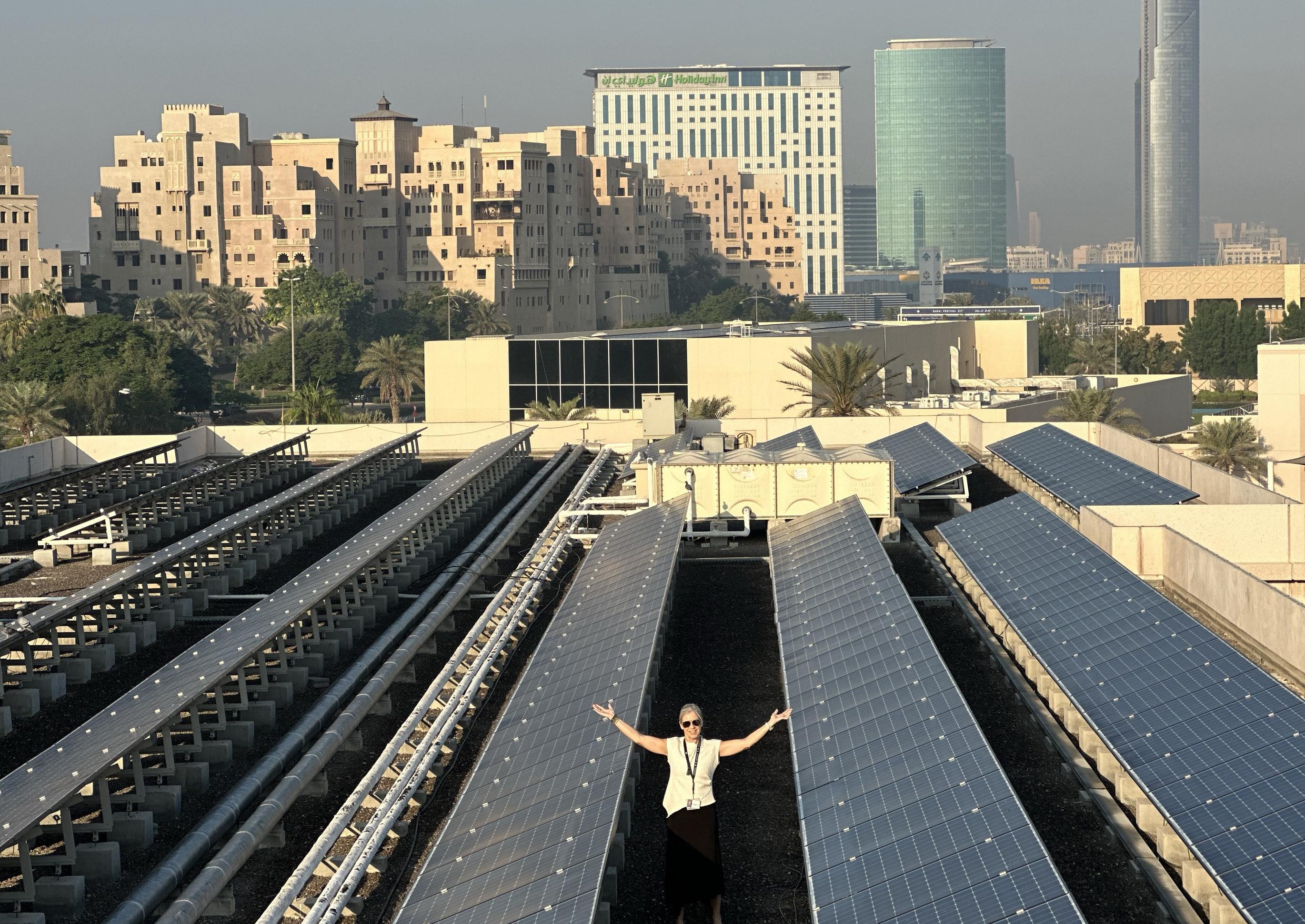
Al-Futtaim Group partners with Silicon Valley-based organisation - Terra.do - to bring climate action into everyday business
How do you mobilise 100 million people to work on climate solutions within this decade? That’s the bold ambition of Terra.do, a Silicon Valleybased EdTech disrupter committed to building the world’s largest climate action learning platform.
With climate change reshaping industries like energy, transportation, and agriculture, the need for a climateaware workforce is clearer than ever.
Al-Futtaim Group, a global organisation with over 33,000 employees across more than 30 markets, is stepping up to this challenge. Partnering with Terra.do, Al-Futtaim has launched a four-week Climate Action Training Programme to equip its employees with both climate fluency and practical skills for everyday work.
As Al-Futtaim Group’s Chief Sustainability Officer, ElloraJulie Parekh, explains, innovation is central to the Group’s approach: “Al-Futtaim has a history of innovating, and I felt that, when it comes to climate learning, innovation is essential. Climate science is rapidly evolving, and so is the way we learn.”
She added, “After exploring the landscape of EdTech players, it was clear that Terra.do has a great platform for building awareness on climate issues and encouraging participants to take action. There’s a reason why the company is Terra.do and not Terra.edu—they push you to DO things differently!”
Seth Collins, Director of Learning at Terra.do, shared the inspiration behind the programme, noting that climateconscious individuals in organisations often find it challenging to drive meaningful change alone.

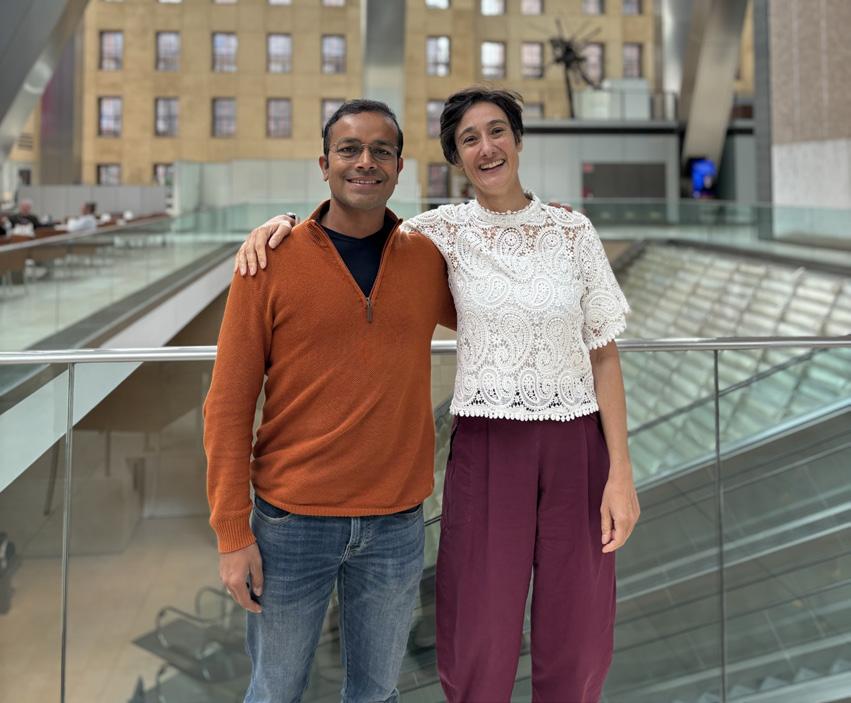
Al-Futtaim Group’s Chief Sustainability Officer, Ellora-Julie Parekh, with Terra.do Founder, Anshuman Bapna, at ClimateWeek forum in New York, USA. This year’s event focused on training, engaging, and upskilling the workforce across critical topics—AI, sustainability, circularity, and carbon removals were front and centre.
“We saw many individuals in organisations, who were already committed to climate action, struggle to drive transformation on their own. The programme helps participants understand how climate affects their business, identify key solutions, and act on them in a way that aligns with business goals, making climate action relevant to every role.”
Kerry Ross, Chief Operations Officer at the Al-Futtaim Education Foundation, is one of the programme’s participants. Reflecting on her experience, she shared, “The training has been a valuable opportunity to explore how we can bring climate awareness into our daily work and future projects. It’s a practical way to make a difference, and I’m excited about the possibilities ahead for our schools and communities.”
At Al-Futtaim’s managed schools—
1. Optimizing Our Climate Footprint
2. Leading on Circular Supply Chains
3. Becoming the Employer of Choice
4. Shaping an Ethical Digital Future
Deira International School and Universal American School— the new knowledge is already making an impact. Both schools have eliminated single-use plastic water bottles and adopted energysaving practices, like turning off lights in unoccupied spaces.
Additionally, large-scale solar panels installed have significantly reduced reliance on grid electricity, promoting renewable energy use across school operations.
The Climate Action Training Programme combines self-paced modules, live workshops, and a guided workbook, allowing employees to translate new knowledge into practical actions across Al-Futtaim’s divisions, including Retail, Automotive, Healthcare, Education, Engineering, and Real Estate.
The first cohort of employees has just completed the programme
and is now busy exploring new ways to incorporate climate action into their roles.
“Together with my Learning and Development colleagues at the Group level and in the divisions, we’re creating a plan to ensure all employees know the Four Sustainability Pillars of Al-Futtaim and keep learning new skills while engaging in sustainability initiatives,” Julie affirmed.



September - December 2024

From Kenya to Japan, the season of educational trips begins, offering students opportunities to learn, explore, and grow beyond the classroom
It’s full speed ahead as DIS students gear up for 2025 NASA challenge showdown in Huntsville, Alabama, USA



Al-Futtaim Group partners with Silicon Valley-based organisation - Terra.do - to bring climate action into everyday business

08
the ball as she aims for the topflight football team
Head of University & Careers Counselling at DIS discusses the options available for those whose results don’t go as planned
58
Al-Futtaim Group internship opportunities bridging the gap between academic learning and practical experience
28 12 68

Step into our classrooms and discover the various ways new tech is shaping student learning
Tracking trends and making numbers make sense – read about Seán Lonergan's journey from IT to Education


34
Whether you’re learning with AI or wondering if it’s smarter than your teacher, our humour page proves there’s always room for a laugh in education
40
We explore why holiday camps are a hit with students and their parents

Dr Farah Sarraj, Chief Corporate Officer, Al-Futtaim Education Foundation and Al-Futtaim Group's AI Champion for Education
Dr Farah Sarraj defends the timeless ‘sacred role of teachers’ against the rising tide of Artificial Intelligence
ill AI revolutionise education?
WIt is imperative that we answer this question before we proceed to imagine or reimagine an education sector powered or supported by AI. And for us to answer this question, we need to look back before we can look ahead.
What I will be doing in the lines and paragraphs below is to share my own views, conjectures, predictions and aspirations relating to the deployment of artificial intelligence within the education space, and specifically within schools.
Has education ever been truly revolutionised?
A decade or so ago, a video on YouTube by Veritasium titled, “The Most Persistent Myth,” went viral with its very simple message: there is nothing that has managed to revolutionise education for over a century and a half. Thus, a full-blown educational revolution remains a myth. Today, there is a lot of talk about ‘the thing’ that will definitely bring about a revolutionary, rather than evolutionary, change to education,
namely, artificial intelligence. Would the AI educational revolution see the end of teachers?
In my view, this so-called revolution has been in the making for the past few decades, perhaps. The use of edtech has been slowly chipping away at the centrality of the teacher as an imparter of knowledge and an “ultimate” sage on the stage, as the metaphor goes.
The ubiquity of technology and the accessibility of information since the rise of the world wide web have facilitated conversations around the shrinking role of the teacher. Even with the advent of AI, we still have those who defend the perpetuity of the need for teachers and those who proclaim that the teaching profession is in peril. With both arguments, however, there is an assumption that AI will “replace” either teachers or functions/tasks of a teacher. And since there are two opposing views on the matter, I have to take a stand on this and put forward my view. Essentially, I would argue that the role of the teacher as
someone who offers support, challenge, wisdom, inspiration and a perspective on lived experiences is a sacred role that is as old as time and, consequently, will survive all trials and tribulations. In short, teachers, more broadly defined as guides, mentors, coaches, masters, tutors, facilitators or any such word, will be around for as long as humanity continues to exist. Is there an exact science behind my claim? Perhaps not; but there is certainly an understanding of the social nature of humans and their hierarchies of knowledge (as in master-student, mentor/disciple…etc) that can support my argument for dismissing all claims that the teaching profession is at peril.


There may be so many fundamentals that they will have to reconsider; such as the sacred and enshrined school timetable, or what Americans like to call a ‘schedule’. Worse still, school leaders may also need to break down classroom walls and create spaces that allow for a differently structured school day, and a more “zoned” learning space. I would say, nonetheless, that the biggest sacrifice that has to be made by school leaders and policymakers is giving up on current assessment practices.
The AI-powered educational system should be a muchneeded revolution that would bring traditional schooling out of the imperial-Victorian model and into the 21st century
Facilitating the transition to the mass deployment of AI in education needs to embrace the new super-charged humans that AI makes of us and of our students. What follows is that the educational continuum, and not just the very top end of it which currently stands at doctorate level study and research, will start focusing more on engaging students in work that brings an original contribution to human knowledge.
What would the AI educational revolution look like, then? I have, perhaps subjectively, established that AI will be the catalyst that will bring about the revolution in education that has had many falsely identified heralds over the years. However, and much as we like to believe in superheroes, whether of the physical or philosophical realms, the fact of the matter is that catalysts can only enable the chemical reaction, but cannot, in themselves, cause it. Therefore, for AI to get its big break and revolutionise education, there will be a lot of prerequisites and conditions that need to be met. To start with, current leaders need to embrace AI through an understanding that is rooted in personal and lived experience. As such, those who are leading educational organisations today need to adopt AI and be experimental with it, pushing every boundary and challenging themselves endlessly in the process. In addition, educational leaders need to be braver in their approach to space and time.
Original contributions to the collective of human knowledge are not just large-scale discoveries, they can simply be the uniqueness of the felt and lived experience of each and every student; they can be the connections that each student makes using their interpretative code that is essentially theirs and theirs only. In short, the revolution that AI will bring to education should be reflected in the spaces that students learn in, in what their day looks like and in what and how they are assessed.
More importantly, the AI revolution will super-charge teachers and free up their time to focus more on guiding their students through journeys of self-discovery, emotional regulation and a heightened awareness of themselves, others and the world in which they live. Once the revolution becomes the new normal in education, no teacher will wish to find a different career, because work-life balance will be struck, and no teacher will feel that they are letting students who need them more down due to lack of time.
In an AI-powered educational system, students who tend to lose focus when things get too much, will be prompted by their teacher who has a massive dashboard that displays the warnings about dipping concentration levels, to go and do their jumping jacks, or use their fidget toys or take a walk around the learning space.
The teacher will not worry about the student taking that time out of the lesson, because that student can come back and pick where they’d left off using their personalised learning path. And even if the student had to leave a collaborative activity, they would still be able to come back and catch-up because the conversation of the group was captured and transcribed by AI, so they can skim through quickly and carry on.

In the AI-powered school model, all students can produce artwork that has the right curves and lines, even when they do not have a particular artistic talent. I do see in the AI revolution a democratisation of art, music and performance. Indeed, the students who are shy to perform can perhaps create avatars of themselves and act without having to face an audience. In short, the AI-powered educational system should be a much-needed revolution that would bring traditional schooling out of the imperial-Victorian model and into the 21st century.

What is the Al-Futtaim Education Foundation (AFEF) doing to promote the AI agenda at its schools?
At AFEF, we are incredibly fortunate to be part of the Al-Futtaim Group (AFG) and to be able to leverage the scale and reach of the Group in everything that our schools and our Foundation are doing. Indeed, in the area of AI and with the appointment of Moza Al Futtaim as the Group’s Chief AI Officer, AFEF and its schools have been receiving guidance, support and inspiration along their AI journey.
We have been working with the Group on rolling out a number of prototypes including a parent bot that would be able to respond to queries relating to school policies and other administrative matters.
AI, in my view, will deliver on the promise of revolutionising education if and when policymakers and education leaders understand the need to open their minds and their hearts to new ways of learning, assessing and “doing business” in the education realm. More importantly, AI will supercharge teachers and students alike and enhance outcomes when used ethically, conscientiously and with high levels of selfawareness.
DIS early-year learners dive into coding with educational robots built for discovery and computational thinking

Year 2 students at Deira International School are full of excitement as they engage with BlueBots. These charming little robots bring learning to life, making each coding activity a fun adventure.
He’s the friendly little robot who loves to crawl around the classroom floor at Deira International School, guiding young learners in coding and teamwork.

BlueBot hangs out with students, helping them count numbers, learn letters, and explore fun challenges. In his own small way, he’s “changing the world” one child at a time—teaching them about technology and the joy of working together.
And here’s the cool part: BlueBot is powered by artificial intelligence (AI). He’s one of the exciting new tools DIS has introduced to bring learning to life. Alongside tablets and smart boards, BlueBot is showing students how fun and creative learning can be. So next time you see him scooting around, remember: BlueBot may be small, but he’s on a big mission to spark curiosity.

Who’d have thought the stuff of sci-fi movies would be the secret sauce in classrooms? At Deira International School, artificial intelligence has moved from being a tech trend to a practical tool that’s transforming how students learn and teachers teach.
Simon O’Connor, Director at DIS, puts it best: “AI at DIS is as transformative as the internet was for education.
Simon O’Connor, Director, Deira International School, and Chief Education Officer
–
Al-Futtaim
School Management Company
Tools like MagicSchool AI have made lesson planning a breeze, helping teachers create engaging, interactive experiences. Virtual field trips and escape rooms powered by AI aren’t just fun—they’re teaching key concepts in ways students love.”
Teachers at DIS are diving into platforms like Canva, EduGPT, and Microsoft Copilot to automate the boring stuff, freeing up time for meaningful connections with students.

Gaynor Dale Primary Head Teacher, Deira International School
Leadership from the top inspires a schoolwide transformation in new tech adoption
Simon adds: “AI is helping us personalise learning, making it more inclusive and impactful for every student.”
Primary Head Teacher Gaynor Dale is all in on AI, too, especially when it comes to teacher development.
“Gone are the days of ticking boxes for evaluations. AI tools like Co-Pilot and ChatGPT let teachers film lessons, reflect, and track progress. It’s about giving them ownership of their growth,” she shares.
Even coaching conversations have had a glow-up. Gaynor explains: “AI summarises meetings and generates action steps in seconds, so I can focus on what really matters—asking the right questions to inspire deeper thinking.”


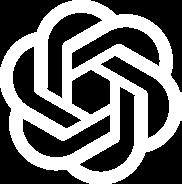



Step into our classrooms with Nicholas Bloom, and discover the various ways new tech is shaping student learning
“At Deira International School, Artificial Intelligence is embraced as a powerful tool driving meaningful transformation in education. AI is not just a supporting tool here; it is central to our strategy, shaping both classroom learning and administrative processes.
his year, AI has become a core part of our vision, enhancing the ways our staff and students innovate, collaborate, and enrich learning outcomes across the school.
As the AI Lead at DIS, I use AI across both teaching and administrative tasks. Tools like Magic School and ChatGPT have become indispensable in the classroom, helping to
create personalised learning experiences. These platforms assist with generating custom quizzes, providing instant feedback to students, and even offering tailored explanations to suit different learning styles.
This automation allows me to focus on deeper, more meaningful interactions with students while ensuring they receive immediate, high-quality support.
AI is also integrated into my lesson planning, where I create dynamic teaching materials that adapt to students' needs.
For example, Magic School and ChatGPT assist in generating differentiated tasks for various abilities, ensuring that all students are challenged appropriately.

By automating routine tasks, I can invest more time in addressing individual student needs, refining instructional strategies, and facilitating a more interactive classroom experience.
In addition to teaching, I use AI for administrative duties like generating meeting summaries, writing emails, and drafting policies. Tools such as Microsoft Copilot, Notebook LLM, and Gamma help me streamline content creation, from podcasts to presentations, while Suno brings creative AI into the mix by composing songs. ChatGPT also plays a significant role in analysing data, combining documents, and providing insights that help me make data-driven decisions. These applications save time and unlock new ways of engaging with content, both for teaching and administration. Looking ahead, I see AI playing a crucial role in student assessment by providing detailed, actionable feedback that goes beyond traditional grading systems. This opens up new possibilities for personalised, consistent evaluation that can drive student growth more effectively.
By prioritising AI literacy among staff and students, Deira International School is preparing a community for a future where AI will play a critical role in every aspect of education

we might face. A school-wide ‘Green Light Lesson Week’ provided an opportunity for teachers to trial AI-enhanced lessons, encouraging experimentation on a manageable scale. Departments have undergone intensive tailored AI training to help set achievable, measurable goals for AI integration.
DIS is taking a phased approach to AI integration across the school, with a clear strategic timeline to ensure that we embed AI meaningfully into our curriculum and pedagogy. Here’s a breakdown of our AI roadmap:
In the first term, our focus has been on identifying AI champions across the school. In primary, we appointed AI champions by year group, while in secondary, each department now has its own AI lead. These champions and leads have been busy brainstorming potential uses of AI and the challenges
As we move into the second term in 2025, departments and year groups will pilot AI tasks in lessons and gather feedback on what works best. Teachers will observe each other’s lessons to identify best practices, and inter-departmental sharing will encourage collaboration. Mid-term, we’ll reflect on our progress, adjusting our approach based on what we learn.
In the final term, we aim to formally embed AI into the curriculum. AI literacy will become a core focus, ensuring that both students and teachers are equipped with the skills to engage with AI responsibly and effectively. Continuous professional development will be provided to ensure that staff stay up to date with the latest AI advancements.

The impact of AI at DIS is evident in the classroom. One standout project showcases how Year 6 students explored AI’s creative potential using Bing Image Creator to develop realistic visuals on sustainable farming. They integrated these AI-generated images into immersive 3D worlds within CoSpaces, creating an interactive experience that brought complex environmental concepts to life.
This project earned a prestigious British Schools in the Middle East (BSME) award, a testament to both the students’ innovation and the support of educators Dan Thomas and Rebecca Harrison, who were instrumental in guiding students through this unique endeavour.
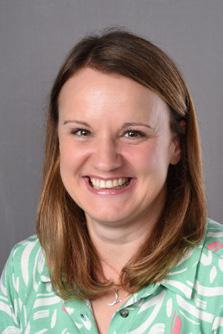

In the Islamic Studies department, Yousef Al Koud has introduced exciting, interactive lessons using ClassPoint and Curipod, allowing students to engage deeply with the material while actively gathering their insights. Additionally, Al Koud’s creative use of nolej. io has transformed YouTube videos into captivating educational experiences, bringing lessons to life in a way that resonates with today’s learners.
In Physical Education (PE), tools like ChatGPT and Magic School are used to provide feedback on BTEC coursework and to create multiple-choice questions, supporting student learning and exam preparation.
The Art department leverages Magic School and ChatGPT for resource creation and artist investigation. AI-driven IBOTs assist students in researching artists, making the learning process more interactive and efficient.
The History department is focusing on student engagement through Magic School’s features like character chatbots and research assistants. These tools allow students to dive deeper into historical events and figures, creating an engaging and exploratory learning environment.
In English, AI is used to create resources, worksheets, and teaching ideas. The English department incorporates ClassPoint in lessons to facilitate AFL, collect ideas, and address misconceptions on key skills. Magic School supports English Language Learners (ELL) through features such as text translation, scaffolding of texts, and summarising YouTube videos. Diffit is another valuable tool for creating worksheets, especially for cover work, providing formats for reading comprehension and text analysis suited to each student's skill level.
Secondary education has also seen the benefits of AI-driven personalisation. George Stroud in the Modern Foreign Languages department uses ChatGPT to help students create customised revision materials, while Education Perfect assists with grammar and feedback.
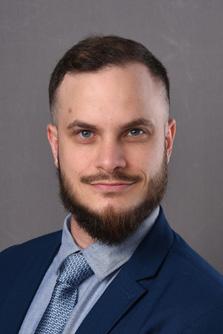
These tools allow students to take charge of their learning, mastering material at their own pace. The mathematics department has also leveraged AI with Sparx Maths, a programme that tailors homework to each student’s needs, ensuring they get the support necessary to succeed.
The momentum is building. Across the school, AI is becoming integrated into daily activities, from lesson planning and teaching to student interaction. The potential of AI is limitless, with opportunities for personalised learning, efficient feedback, and enhanced classroom engagement.



Our strategy aims to empower students by integrating technology into the learning process We believe in harnessing the power of digital tools to enhance creativity, collaboration, and critical thinking among our students.
We are committed to leveraging technology to enrich teaching and learning experiences. By using platforms like Microsoft Office 365, Tapestry, Seesaw, OneNote Class Notebook, Teams, and ManageBac, we aim to streamline processes and support all stakeholders.
Digital literacy and online safety are integral parts of our strategy We aim to equip our students with the necessary skills to navigate the digital world safely and responsibly.

We are dedicated to staying ahead of emerging technologies. Our future plans involve further investment in digital resources, staff training, and cultivating awareness of emerging technologies like AI.

We utilise Cognitive Abilities Test (CAT4), Ability Based Teaching (ABT) assessments and digitial platforms to gain a deeper understanding of our students’ abilities and learning styles These insights allow us to tailor our teaching methods and create a more inclusive learning environment.

We believe in the power of community Student, parental, and community involvement are integral to the success of our digital strategy. We aim to empower all stakeholders with digital skills and competencies.

Digi Know? It’s not just a playful twist on “Did You Know?” It’s the ultimate resource for teachers at Deira International School looking to stay ahead in the ever-evolving world of educational technology.
Created by Kieran Birrell, Head of Computing and Digital Education Lead, this bi-weekly feature is packed with tips, tools, and strategies to help educators confidently integrate the latest tech into their teaching.
From interactive apps to classroom hacks, Digi Know is all about making lessons more engaging and impactful.
We sat down with Kieran to learn more about his inspiration for Digi Know and the impact it’s making at DIS.
Momentum: What inspired you to start Digi Know, and what do you hope DIS teachers gain from it?
Kieran: The idea for Digi Know came from a desire to bridge the gap between traditional teaching methods and the rapidly changing world of ed tech,” Kieran shares. “I wanted to create a resource that helps teachers explore new tools with confidence and ease. My hope is that teachers at DIS not only develop valuable skills but also feel inspired to enrich their teaching practices. Ultimately, it’s about engaging students in more dynamic, creative, and personalised ways.”

Momentum: Can you share some of your favourite tools or strategies featured in Digi Know?
Kieran: Together with my team, we have introduced a wide range of tools through Digi Know, many of which have become classroom favourites:







At Deira International School, the integration of AI isn’t just about using the latest tools; it’s about crafting an educational experience where each student’s unique potential is nurtured.
ClassPoint:
Turns PowerPoint presentations into interactive experiences with quizzes and drawing activities.
MagicSchool and Magic Student: Personalise learning and help track student progress.
BriskBoost: Keeps students organised with task and deadline management.
Canva AI:
Enhances creativity with professional-quality design tools for projects and presentations.
EdCafe AI:
Encourages collaboration and meaningful group discussions.
Century Tech:
Creates tailored learning pathways for individual student needs.
Momentum: What feedback have you received from teachers or students who’ve applied tips from Digi Know in their classrooms?
Kieran: The feedback has been fantastic. Teachers love how practical and accessible the tips are. They’ve told me their lessons feel fresher and more interactive, which has made a real difference in student engagement. Students, on the other hand, are enjoying the creative and hands-on aspects that these tools bring. Overall, it’s been rewarding to see how Digi Know has added value to teaching and learning across the school.
“These tools have transformed classrooms across both primary and secondary levels at DIS, making lessons more interactive, engaging, and effective,” Kieran explains.
CoPilot and ChatGPT:





Assist teachers with lesson planning and student support.
Vidnoz:
Enables multimedia-rich, engaging lessons with custom video content.
Napkin AI: Supports brainstorming and idea organisation.
Microsoft Reading Coach:
Boosts reading skills with personalised feedback.
Notebook LM: Makes notetaking and organisation efficient for both teachers and students.

1943
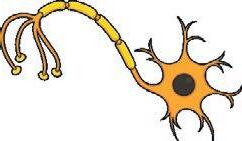
An article about artificial neurons was published. The article described the first mathematical model of a neural network.

AIBO
The first robot pet dog was launched by Sony. Its skills and personality developed over time through interaction with its owners and surroundings.
1950
The term artificial intelligence was first formed and classed as an academic field.
Alan Turing developed a test to check a machine’s ability to exhibit human-like intelligence.

1955-1956
The first universal language chatbot that could simulate chatting with a real person over the Internet was created.

1995
IBM Deep Blue IBM created the first computer to beat a world chess champion. 1997 1999

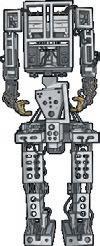

Siri
Apple integrated a voice assistant into their mobile phones. It was able to converse back and forth with the user.
2011

Roomba
The first mass-produced autonomous robotic vacuum cleaner was created. It could learn how to navigate and clean homes.

2011
IBM Watson
A question and answering computer was created. It was able to win first prize in an American quiz show.



1956
A program was created to mimic human-like mathematics skills including some problem-solving capabilities.
1970-1973
WABOT-1
A robot with limb control, vision and conversational systems was created. It was able to communicate with a human in Japanese, walk and grab objects.

2011 Alexa Amazon launched their own virtual assistant.
2014
The first chatbot called ELIZA was created. It was the first program that allowed simple forms of conversation between humans and machine.

1964-1966
1970
A computer system was designed to solve complex problems and make decisions similar to a human expert.

1966-1972
Shakey
The first general-purpose mobile robot was created. It performed tasks that required planning, route-finding and rearranging objects.
answering computer able to win first quiz show.

GPT-3
An artificial neural network was designed to process and understand human language. It can perform many languagerelated tasks, such as translation, answering questions and generating text.
2016
Sophia
A realistic humanoid robot capable of displaying human-like expressions and interaction was developed. It was later granted citizenship in Saudi Arabia and was the first robot Innovation Ambassador for the United Nations.
2020 2023
GPT-4
A sequel to GPT-3 was released. GPT-4 is capable of processing images as well as text and can produce more complex tasks.



Global leaders and decision-makers from schools, academia, public and private sectors meet at inaugural World Schools Summit to ‘unleash the Hidden Curriculum’
Culture—it’s the beliefs, norms, dress, expectations, values, and diet. But it’s also about perceptions, relationships, attitudes, and all the unspoken rules that influence how school communities work together every day. Combine all of this, and you get the ‘Hidden Curriculum’.
At the just-concluded World Schools Summit (WSS), more than 600 leaders and decision-makers from schools, academia, NGOs, and the public and private sectors from around the globe came together in the UAE to “unleash the hidden curriculum.” This concept encompasses the implicit, often unspoken values that shape a school’s culture.
“Unlocking the ‘Hidden Curriculum’ represents the future of global education,” announced Simon O’Connor, Chairman of the WSS Leadership Council and Director of Deira International School, setting the tempo for this year’s inaugural summit.
“The hidden curriculum goes beyond what is written in textbooks or outlined in lesson plans,” he elaborated. “It reflects the norms and attitudes imparted to students by teachers— intentionally or not—shaping their work ethic, capacity for critical thinking, and views on inclusivity, equity, and wellbeing,” O’Connor added.
The summit brought together participants from 84 countries, including the USA, Brazil, Finland, India, Uganda, Singapore, and Argentina. Over two days, the event featured a variety of discussions, workshops, and debates focused on rethinking how schools operate, how teachers are supported, and how students learn. Established by T4 Education in partnership with Al-Futtaim Education Foundation, Scholastic, DP World, and other key sponsors, the event was designed to empower educators and school leaders.
“This global summit brings together education stakeholders from around the world to exchange ideas and address key challenges,” said Vikas Pota, Founder and CEO of T4 Education. “By connecting educators, policymakers, and industry leaders, we are paving the way for meaningful discussions that can transform the future of education for students and teachers everywhere.”
Among the most talked-about sessions was a panel on school leadership featuring H.E. Aisha Abdulla Miran, Director General of the Knowledge and Human Development Authority (KHDA). She was interviewed by Mariam, the Deputy Head Girl at Deira International
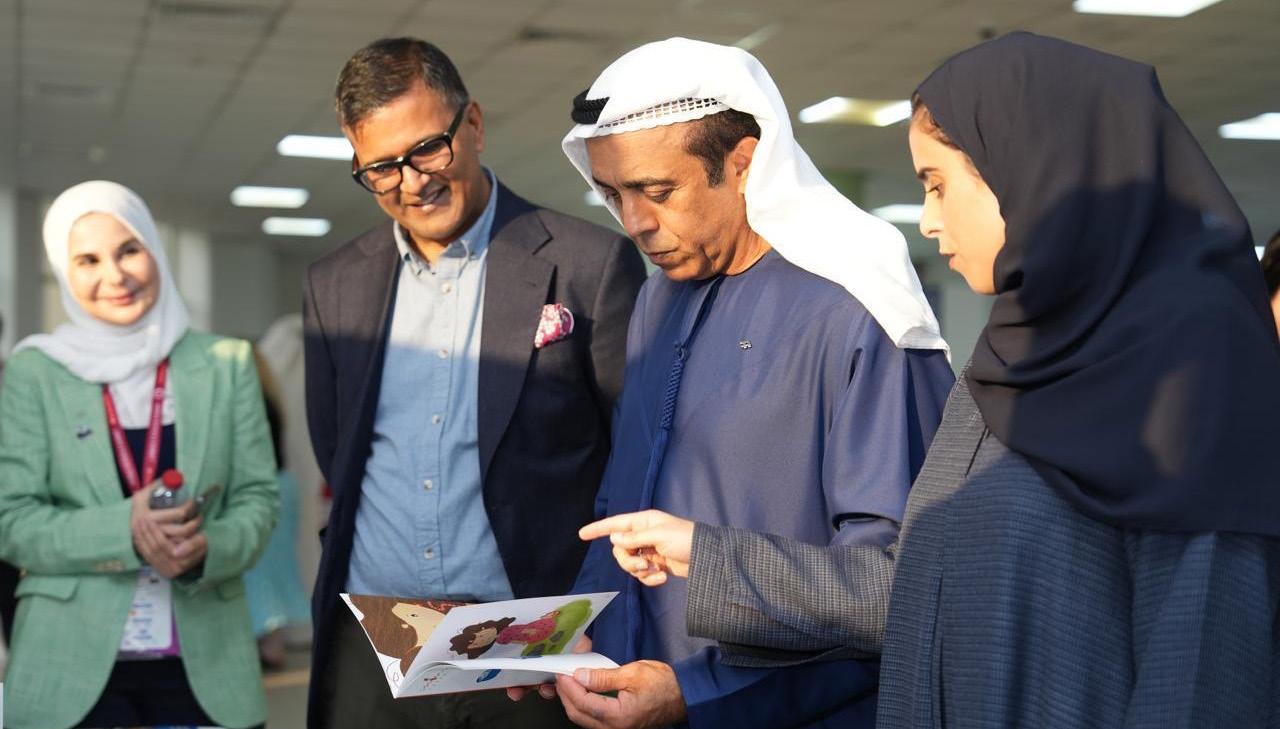

Among the most talked-about sessions was a panel on school leadership featuring H.E. Aisha Abdulla Miran, Director General of the Knowledge and Human Development Authority (KHDA). She was interviewed by Mariam, the Deputy Head Girl at Deira International School, who asked rapid-fire questions about leadership, AI in education, and student wellbeing.
School, who asked rapid-fire questions about leadership, AI in education, and student wellbeing. During the session, Aisha emphasised the KHDA’s commitment to supporting both educators and students, highlighting initiatives like Project 33, part of Dubai’s Education Strategy 2033. This ambitious plan aims to transform the education system in Dubai, ensuring every student receives a world-class education aligned with high global standards.
Another highlight of the summit was a plenary presentation by Andreas Schleicher, Director for Education and Skills at the Organisation for Economic Co-operation and Development (OECD), who explored how school culture impacts the success of students and teachers. “Education doesn’t stop at the curriculum. It’s the values and relationships we cultivate in our schools that make a lasting difference,” he said.
Olli-Pekka Heinonen, Director General of the International Baccalaureate Organisation, spoke passionately about the importance of leadership that uplifts both teachers and students. He shared practical ideas that left the audience reflecting on how small changes in leadership can create big shifts in school communities, sparking a sense of possibility and purpose among attendees. The debates were a crowd favourite, with passionate voices lighting up the stage. Asad, a student from Deira International School, made a compelling case for prioritising mental wellbeing over

“By
connecting educators,
policymakers, and industry leaders, we are paving the way for meaningful discussions that can transform the future of education for students and teachers everywhere.”
standardised test scores. “What’s the point of good grades if students are struggling emotionally?” he asked, earning a thunderous round of applause from the audience.
In addition to thought-provoking discussions, the summit offered hands-on workshops that provided tools and strategies educators could take back to their schools. Alex Gray, founder of DEEP Learning, led a session on integrating artificial intelligence in classrooms. Participants explored how AI could be used to enhance both teaching methods and student engagement.
“AI isn’t here to replace teachers but to complement their work,” Gray explained. “With the right approach, it can help educators focus on what they do best connecting with their students.”
As the summit concluded, one message stood out: collaboration is essential to unlocking the hidden curriculum. Schools, governments, and privatesector stakeholders must work together to create educational environments that go beyond the basics.
“It’s time to rethink what education means and how we prepare our young people for the future,” said Mira Al Futtaim, Chief Future of Education Officer, at Al-Futtaim Education Foundation. “The Hidden Curriculum is not just a concept—it’s a call to action.”
Tracking trends and making numbers make sense – read about his journey from IT to Education


He’s the go-to guy for every stat, figure, and decimal point that keeps Universal American School ticking. From tracking students’ academic performance to making sense of faculty-student ratios and assessment trends, Seán Lonergan knows it all.
Armed with a background in IT, he swapped coding and network firewalls for grade books and academic dashboards, bringing a tech edge to tracking student growth and shaping educational strategies.
Momentum: Probably start with a brief intro about yourself. Where were you working before joining UAS?
Seán: I’m Seán Lonergan, the Academic Data Analyst here at Universal American School. Before joining UAS, I spent over two years at Dell Technologies in Ireland in data-focused roles, primarily reporting on team member experience, incident monitoring, and endpoint/application reliability.
Momentum: What was it like transitioning from the IT sector to working in education? Were there any challenges or similarities between the two fields?
Seán: Transitioning from IT to Education has been rewarding and enjoyable, with the supportive culture at UAS making the change much smoother. The biggest challenge in the transition - and in any new data role - is familiarising yourself with all the data sources, understanding stakeholder reporting expectations, and setting a roadmap for deliverables. This process was greatly aided by the collaborative team here at UAS and the senior leadership, who were always clear and supportive in defining data requirements.
In terms of similarities, both sectors involve core analysis work, such as gathering requirements, collecting, cleaning, processing, and visualising data from diverse sources to derive actionable insights.
I’ve found the difference is the purpose of the data: in education, it enhances student outcomes and supports teachers with data driven decisions. This transition has given me an insight into how data can drive individual growth as much as it does organisational.
Momentum: How has your experience in IT influenced the way you approach data analysis in an educational setting?
Seán: My previous experience has influenced my analysis approach in the following areas:
• Ensuring Data Integrity, Reliability, & Security.
• The use of KPI’s to support data driven decisions.
• Time or Project Management to meet deliverable deadlines & manage requests.
• Proficiency with tools & software for analytics & report creation.
• Problem solving & effective communication.
awards recognise remarkable talent within our student body, ensuring that college fees barriers won’t stand in the way of their bright futures

From Toronto to London, from Los Angeles to Hong Kong, it’s scholarships galore for the Class of 2024 at Deira International School. Thanks to generous support, including key contributions from the Al-Futtaim Education Foundation, our students are stepping into prestigious institutions like the London School of Economics, Imperial College London, Carnegie Mellon University, UCLA, and the University of Toronto, armed with an astounding $7,089,978 in annual scholarships — a total of $28,359,912 over four years.
The Al-Futtaim Education Foundation has been instrumental in supporting these achievements, alongside a variety of merit-based scholarships from universities, primarily in the United States, Canada, Europe, and local institutions.
The financial support ensures that our students can confidently pursue their higher education dreams, fully backed by both external awards and our school’s partnerships, such as the Concourse Global application match system. Among the many success stories, Brent
D’Souza, accepted by the University of British Columbia for Mechanical Engineering, has secured $110,000 CAD through International Major Entrance Scholarships and other awards, and Ima Fazlan, set to study Economics at the University of Toronto’s St. George Campus, has been awarded $47,000 CAD annually, covering her full tuition.
Kevin Dupont, Head of University & Careers Counselling at Deira International School, shared his pride in the Class of 2024's success, stating: Watching them step confidently into the next chapter of their lives is a proud moment for all of us.”
“Our students have worked incredibly hard, and it’s truly rewarding to see their efforts recognised with such prestigious scholarships and university offers.

“The scholarship has removed the cost as a barrier to pursuing my degree at one of the top universities in the world”

For Brent D’Souza, a scholarship isn’t just a financial award—it’s the key to unlocking a world of possibilities. As one of the standout graduates of Deira International School’s Class of 2024, Brent has been awarded the Outstanding International Student Award, Okanagan Welcome Award, and International Major Entrance Scholarship, totalling CAD 110,000. These scholarships are Brent’s ticket to the University of British Columbia (UBC), where he will pursue a Bachelor of Applied Science in Mechanical Engineering. His story is a testament to how hard work can shape a promising future.
Momentum: How does receiving this scholarship influence your plans and excitement about starting your studies at the University of British Columbia?
Brent: I feel incredibly honoured to have received these scholarships, which have removed the cost as a barrier to pursuing my degree at one of the top universities in the world, surrounded by nature. Not only have I gained acceptance into my dream university, but this financial support gives me the freedom to explore career opportunities and focus on what truly interests me.
UBC’s balance of academic challenge and supportive environment makes me confident that I will thrive.


The welcome I’ve received from the community— students, professors, and staff—has been heartwarming. I can’t wait to contribute to research at the HighPerformance Powertrain Performance Laboratory, which focuses on improving powertrain systems’ performance and efficiency.
Momentum: What does this scholarship mean to you in terms of the opportunities it opens up for your academic and personal growth?
Brent: Receiving this UBC Scholarship means I can join the Society of Scholars, which connects me with other first-year scholars, returning scholars, alumni, and community members. The programme offers workshops, events, and leadership opportunities, ensuring I’m fully supported throughout my studies. It’s an incredible platform to help me grow academically and personally, and I’m eager to take full advantage of these opportunities.
Brent D' Souza
Course: Mechanical Engineering University: University of British Columbia (UBC) Scholarship: $110,000 CAD, International Major Entrance Scholarship (IMES) and Outstanding International Student (OIS) Awards
With a full tuition scholarship to study Economics at the University of Toronto, Ima Fazlan is paving the way as the first girl in her family to study abroad
As the first girl in my family to study abroad, this scholarship is more than just a personal achievement—it’s a huge milestone for my family,” says Ima Fazlan, her excitement clear.
With a full tuition scholarship of $47,000 CAD annually to study Economics at the University of Toronto, St. George’s Campus, Ima is charting a new course, not just for herself but for the next generation of her family.
“This scholarship changes everything,” she shares. “I can dive into my studies without the stress of finances holding me back. It’s a huge weight off my shoulders, and it’s given me the confidence to aim even higher.” Joining one of the world’s top universities, she can’t wait to embrace the challenges and opportunities that lie ahead.

For Ima, the scholarship represents far more than just financial support. “It’s a gateway to growth—personally and academically. I’ll be working with brilliant minds, diving into research, and learning from professors who are leaders in their fields. It’s the kind of opportunity you dream about.”
As she prepares for her next chapter, Ima has her sights set on excelling in her studies and getting involved in research that makes an impact. “I want to explore every corner of economics, build strong connections, and make the most of every chance I get.”
Her advice for students aiming for scholarships? “Don’t be afraid to dream big and work hard for it. You’ll face setbacks, but stay focused, ask for help, and push through. You never know where it might lead you.”

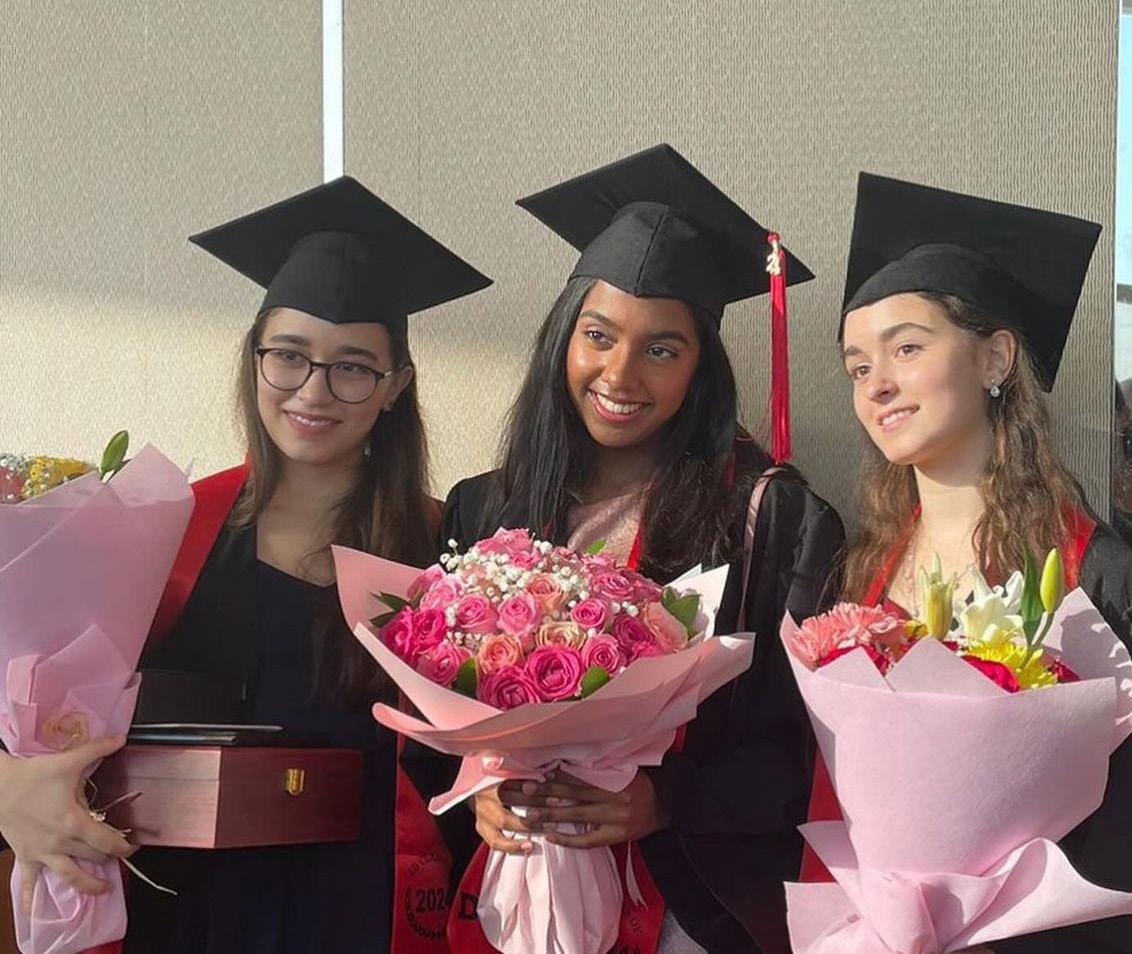
Ima Fazlan Course: Economics University: University of Toronto, St. George’s Campus Scholarship: $47,000 CAD annually, Full Tuition
Tt wasn’t just about observing doctors—it was personal for Vasudha.
From an early age, Vasudha Ayyagari, a recent graduate from Deira International School, found herself in hospital rooms, watching how doctors and nurses cared for her mum. Those experiences sparked something inside her, setting the course for her future.
What began as a young girl’s curiosity has now grown into a determined pursuit of a career in medicine, with multiple offers from prestigious global universities to study this demanding field. She settled for her favourite choice: Queen’s University Belfast.
“I was always fascinated by how the medical staff made a difference in my mother’s life as well as other patients,” Vasudha recalls.
For DIS students who dream of following in her footsteps, Vasudha offers this advice: “know yourself. Medicine is a long journey, and it requires a lot of perseverance.”
It wasn’t just fascination, though—her drive to understand the medical profession grew stronger with every hospital visit. Fortunately, Deira International School became a place where her growing interest was encouraged and supported.
Through initiatives like ‘The Extended Project’, Vasudha was able to dive deeper into the subjects that mattered to her most, solidifying her decision to pursue a future in medicine.
But the path wasn’t without its challenges. Moving from GCSE to IB was a big leap, and she found herself struggling at first with the amount of content to learn and figuring out the best ways to study.


How early hospital visits with her mother sparked a lifelong passion for medicine for Vasudha Ayyagari, a graduate of Deira International School


“The workload was definitely overwhelming at times, and it took me a while to find my rhythm,” she says.

However, she quickly discovered the importance of leaning on others. “Asking for help doesn’t make you weak; it actually strengthens you,” she explains. With the backing of her teachers, friends, and family, Vasudha pushed through, determined to achieve her goal.

For DIS students who dream of following in her footsteps, Vasudha offers this advice: know yourself. “Medicine is a long journey, and it requires a lot of perseverance. It’s not about comparing yourself to others but about focusing on your own progress.”
Balancing academics and school life was another lesson Vasudha learned during her time at DIS. Rather than chasing popular extracurriculars, she carefully selected activities that aligned with her interests and helped her grow as a person. “I picked things I was truly passionate about, which made all the difference,” she says.
Looking back, she believes her success in securing top university offers came down to a strong support network and a relentless curiosity. “My family played a huge role, especially with things like perfecting my personal statement and attending university fairs,” she shares. But one of her biggest sources of support came from Kevin Dupont, the Head of University & Careers Counsellor at DIS.
“Mr Dupont helped me keep a balanced approach throughout my IB journey, and his guidance was invaluable in shaping my future,” she avers.
Next time you see Syed Zakaria directing traffic or reminding you about your lanyard, remember that it’s all part of keeping our school safe and running smoothly




Sweat dripping down his face in the warm Dubai weather. A whistle in his mouth, one hand straightened at 180° directing traffic while the other waves at parents and students as they drive in and out of school.
This is a typical morning for Syed Zakaria, the Team Leader, Security Guards at Universal American School. Together with his entire team, their hard work ensures that the school community is safe, secure, and running smoothly every single day. Zakaria takes us behind the scenes of what it takes to keep the campus safe and the day running smoothly.
“We kick off the day at 6 AM. I assign duties to the security team, and we head out on our morning patrol. The goal is simple—make sure everything is safe and secure before the day begins. Part of that is setting up traffic cones, warning tapes, and signs to ensure smooth traffic flow while keeping health and safety in mind.
Once the patrol is done, everyone gets stationed at their posts, ready to manage the busy flow of students, parents, and school buses. You’ll usually find me and my colleague Tanveer Ahmed, who also leads the security team, at the busiest spot: Gate 1. This is where things can get hectic, so we keep a close eye on traffic, coordinate with the team through our radios, and make sure everything runs like clockwork.

Our goal is to keep things running smoothly without any hold-ups. It’s a bit like conducting an orchestra—each car, parent, and student is like an instrument, and we make sure everything plays in harmony.
My team and I play a crucial role in maintaining the safety of our school. It’s not just about securing the campus; we also ensure that staff, students, parents, visitors, and faculty are always wearing their lanyards when they’re onsite. This small but essential task is a big part of our school’s security protocols, allowing us to keep everyone safe. By quickly identifying people through their colour-coded lanyards, we meet the school’s need for thorough risk management.

Our goal is to keep things running smoothly without any hold-ups. It’s a bit like conducting an orchestra—each car, parent, and student is like an instrument, and we make sure everything plays in harmony.
At the gates, we always ask visitors who they’re meeting, and confirming their appointments before they’re allowed in. A quick message goes out to the person they’re visiting, and once we get the confirmation, they’re good to go.
It’s also important to us that we maintain a friendly, welcoming environment. Since we’re the first people visitors meet, being welldressed, polite, and helpful really matters. We want everyone to feel safe and know we’re here to assist them.”
It’s full speed ahead as DIS students gear up for 2025 NASA challenge showdown in Huntsville, Alabama, USA

They’ve done it again!
For the second consecutive year, the Deira International School (DIS) science team has secured their place in the prestigious 2025 NASA Human Exploration Rover Challenge (HERC).
This year’s competition promises to be even more intense, with a 40% increase in applicants, but the DIS team is ready to face the challenge head-on. Among the 72 teams participating from around the world, the group of 25 secondary science students from DIS remains the only team from the UAE and GCC region to qualify, and they have high hopes of surpassing last year’s achievements.
Each student on the team brings unique skills to the project, contributing to different areas like materials and structure, safety protocols, documentation, propulsion and steering, and overall design. Their hard work has earned them the opportunity to represent the UAE in Huntsville, Alabama, where they will compete against universities and technical colleges from across the globe.
to succeed again. We’re ready to bring a trophy back to DIS and make the entire school proud.”
The UAE’s commitment to space exploration through its partnership in NASA’s Artemis programme underscores the importance of initiatives like the NASA HERC. In 2020, the UAE Space Agency signed the Artemis Accords, cementing their role in future lunar missions, with plans to contribute an astronaut and airlock to future Artemis missions.

Nadiv Tashadur Rahman, an IB1 student and Team Lead for the DIS HERC 2025 group, expressed confidence in his team. “We’ve built something truly special this year,” he said. “I trusted my team and our abilities from the very start, and I knew we had what it takes
DIS’s participation in such international events reflects the country’s broader ambitions in space exploration and science education.
Simon O’Connor, the school’s director, praised the students’ determination and innovation: “These students are not just representing the school; they’re representing the UAE on a global stage. Their drive to push boundaries and work collaboratively is inspiring. This competition offers them a unique platform to apply their scientific knowledge and problem-solving skills in real-world scenarios. We couldn’t be more proud of them.”


O’Connor also highlighted the crucial support the team has received from the Al-Futtaim Group, which will provide technical resources to help the students fine-tune their rover for the competition. “The assistance has been instrumental,” he noted. “From access to industry-grade equipment to expert guidance from professionals within the Al-Futtaim Group, these students have been given the tools to enhance their project and take it to the next level.”
Kerry Ross, the Chief Operating Officer at Al-Futtaim Education Foundation (AFEF), played a key role in securing this support. “We believe in nurturing talent, and these students have proven their ability to take on challenges that require both creativity and technical expertise,” she
The UAE’s commitment to space exploration through its partnership in NASA’s Artemis programme underscores the importance of initiatives like the NASA HERC.
said. “Providing them with access to our resources was a no-brainer. It would be amazing to see how they utilise the equipment to refine their rover design, and we’re confident they’ll make a big impact at this year’s competition.”
Dominic Bourn, the STEM teacher at DIS who has been guiding the team through the process, echoed Ross’s sentiments: “It’s been incredible watching these students grow through the project. They’ve been relentless in their pursuit of excellence, constantly looking for ways to improve the rover’s performance. With the support they’ve received, I believe they’re in a stronger position than ever to stand out at the competition.”

Nadiv and his team will travel to Huntsville in April 2025, ready to showcase their rover and compete against some of the brightest minds in science and engineering, but for now, the students remain hard at work, continuously testing and refining their design.
Grade 8 student Carly isn’t just kicking goals; she’s setting her sights on a future with Manchester City’s topflight football team.
As a young player at Universal American School and part of the Manchester City Academy Youth Football League (YFL) in Dubai, Carly’s journey is filled with memorable achievements, a strong support system, and an unstoppable drive.
“My family is very supportive, and I truly appreciate them,” Carly shares with a smile. “They encourage me to show who I am on the pitch and push my full potential.”
Her football story began with inspiration from players she watched on TV as a young girl. Since then, she’s tried her hand at swimming, gymnastics, and tennis before finding her true passion in football.

Joining Manchester City’s YFL in January 2024 has been a life-changing step. “I’ve made a lot of new friends and learned to be a team player,” Carly says.
She credits much of her progress to two important figures: her coach at Man City, Coach Hayley, and her PE teacher, Miss Brophy. “Coach Hayley believes in me and encourages me to be my best. When I make mistakes, she doesn’t get mad but makes me feel like I shouldn’t give up. She’s taught me so many new skills,” Carly explains. Miss Brophy also plays a big role,


motivating Carly to try new things and always reminding her of the importance of hard work and training.
Carly’s list of accomplishments reflects her commitment and talent. “I’m proud to have been awarded Player of the Term, received Most Valuable Player twice, and scored six goals in four games,” she shares, adding that the thrill of celebrating goals and pulling off impressive skills during games are some of her most cherished moments on the field. Balancing school and football training is no small feat, yet
Carly has managed to create a routine that works for her. “As soon as I get home, I have lunch and then study for about two hours before I leave for football at 6:30pm. I have to set a plan for each subject,” she explains. With league matches every Sunday afternoon, her schedule is packed, but Carly’s passion fuels her motivation.
For others with dreams of their own, Carly has a simple but heartfelt message: “To those passionate about football, go ahead and start—it’s never too late! Football has truly shaped my personality, and it’s the best thing ever. I’ve made so many friends and learned new things. If I can do it, anyone can.”

To those passionate about football, go ahead and start—it’s never too late! Football has truly shaped my personality, and it’s the best thing ever. I’ve made so many friends and learned new things. If I can do it, anyone can.”
Focused and fierce, Carly keeps her eye on the ball, poised to score in her iconic Manchester City blue—a young talent driven by her dreams of one day joining the top team

challenge yourself—how quickly can you find all the words?







it’s time for a COFFEE BREAK!


2. People with this job can use AI to create recipes and suggest combinations of ingredients based on dietary restrictions and taste preferences.
6. Al is able to process , learn and problem-solve.
7. The process of teaching a computer how to learn and make decisions on its own.
9. AI can make based on what it has already learnt.
12. A programming language commonly used in AI and machine learning.
13. The type of AI that allows you to unlock a smartphone using your face is known as recognition.
15. The person you ask for permission before using any AI technology.
1. The scientist who invented the Turing machine.
3. With AI, human is less likely.
4. A device that uses AI to understand and respond to voice commands.
5. The type of information you should not share with AI systems.
8. The scientist who created the term ‘machine learning’.
10. A type of AI that imitates human conversation.
11. Pattern-recognition AI can filter unwanted emails into this folder.
14. AI uses this software to detect harmful content on a computer.

Why did the AI break up with the computer? It found someone with better data compatibility.





What’s an AI’s favourite music genre?
Algorithm & Blues.

What’s a robot’s favourite snack?
Microchips!


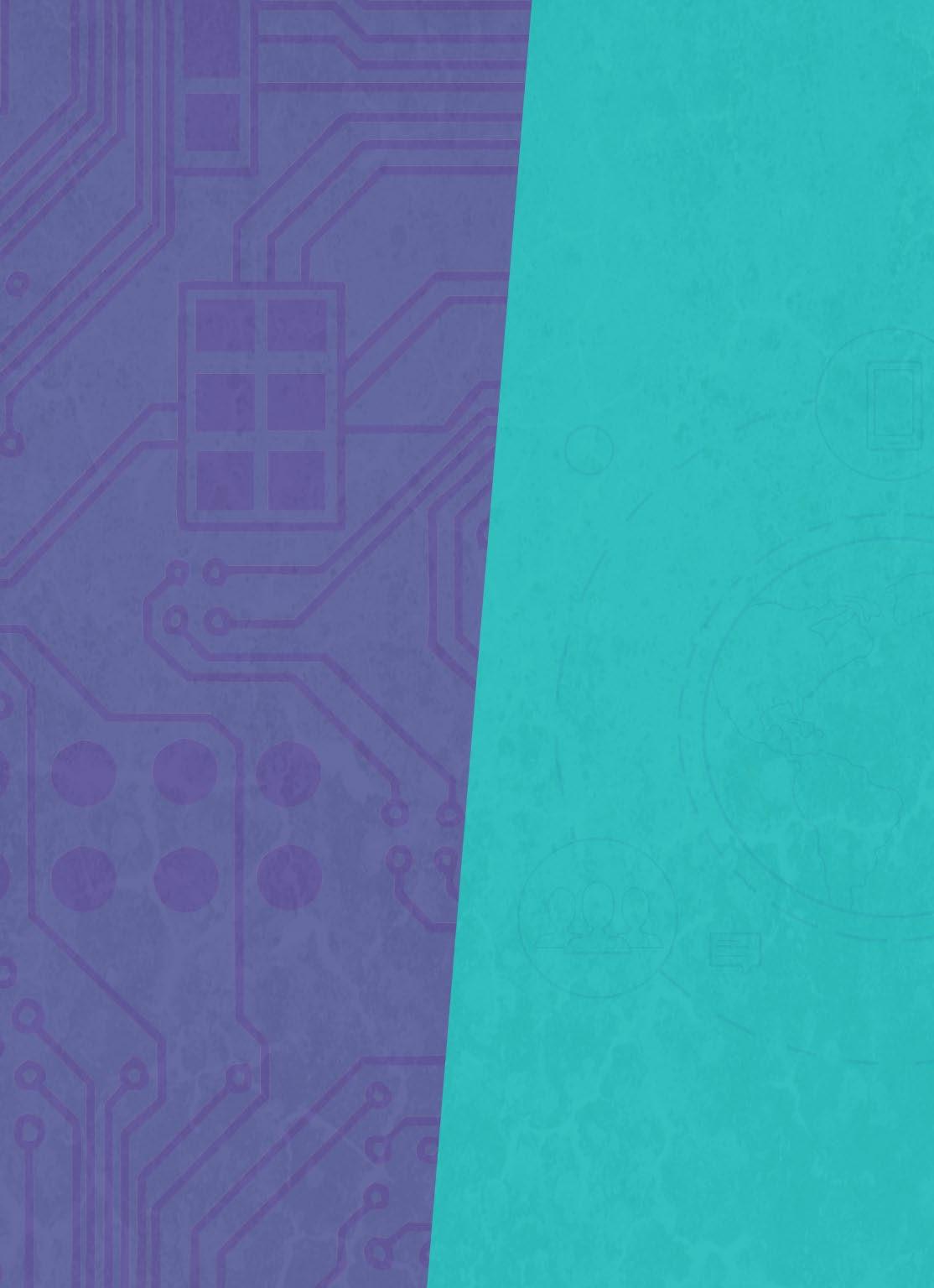
Why did the AI apply for a job as a chef? It had a knack for bytesized recipes!



How do robots pay for things?
With cache!

Discover how one of our students is gearing up to make his MotoGP aspirations a reality
For most four-year-olds, a toy car or bike is enough. But for Oscar, now a Year 8 student at Deira International School, that all changed at a themed party when he spotted a real motorbike right in the living room.
As soon as he climbed onto the bike, he didn’t want to get off. It was a spark that no one could shake.
“I remember climbing onto that bike at the party and feeling like I was on top of the world,” he says. “I didn’t want to get off—it’s like I knew I was meant to be there.”
The passion didn’t fade. By age six, Oscar’s parents surprised him with his very own bike, and he spent every moment he could riding around their family’s farm, navigating rough terrain with the focus of a pro-in-the-making. Oscar’s dad, Joel, who used to be a biker himself, was thrilled.

The two bonded over racing, and soon, Oscar’s eyes were glued to the screen, watching his “superhero”
Marc Marquez, the fearless Spanish MotoGP star. “My dad used to ride, so he gets it,” Oscar says. “When we watch MotoGP together, it feels like I’m part of the race. Marc Marquez is my superhero!”
After
moving to Dubai, Joel was eager to support

Oscar’s hard work and talent have earned him a place on the SK (Shark Katrin) team, one of only two riders selected from more than thirty hopefuls in his age group. With the support of his coach, family, and team, he’ll soon compete in Dubai’s MiniGP series for the first time this December.
“Being chosen for the SK team out of so many riders makes me want to work even harder,” Oscar says. “December’s race is going to be amazing!”
But Oscar’s aspirations go beyond this year’s race. His dream is to eventually compete in MotoGP, where he’ll race alongside his idols, including Marc Marquez himself. “Every time I’m on the track, I feel closer to my goal,” he says. “One day, I want to race in MotoGP too, right next to the riders I look up to.”


“One
day, I want to race in MotoGP too, right next to the riders I look up to.”
Year 8 student Oscar leans in with precision, one knee skimming the tarmac as he races toward his MotoGP dreams on Dubai’s circuit.


Dominic Bourn, Head of Physics at DIS, shares how EdTech is turning his classroom into a launchpad for future scientists, engineers, and innovators
Flipping through the pages of this magazine, you’ve probably come across that fantastic feature about the science whizzes at Deira International School who earned an invitation to NASA after creating their own rover design.
Now, that’s a classic example of how the school is pushing the boundaries, making science not just something to study, but something to experience. And at the centre of this dynamic approach is education technology—EdTech—which is transforming STEM
learning into an adventure that prepares students for real-world careers.
Dominic Bourn, Head of Physics at DIS, shares how EdTech is turning his classroom into a launchpad for future scientists, engineers, and innovators. “In science, we’re using Artificial Intelligence tools like ClassPoint, CoPilot, and Magic School to enhance how students interact with complex concepts,” Bourn explains.

In science, we’re using Artificial Intelligence tools like ClassPoint, CoPilot, and Magic School to enhance how students interact with complex concepts.
“These platforms help bring the material to life in ways traditional methods couldn’t. It’s not just about reading and listening anymore—it’s about exploring and doing.”
The lab at DIS isn’t your typical science classroom, and that’s thanks in part to powerful simulations. “Physics, especially, benefits from virtual labs,” Bourn notes. “With these tools, students can manipulate variables, visualise processes that are invisible to the naked eye, and even conduct experiments too dangerous for a real lab.”
Problem-solving isn’t just a skill to be taught; it’s one to be practiced. And at DIS, EdTech is woven into the curriculum to support this. “Our resources are a mix—some created by the DIS team, others adapted from well-known publishers,” Bourn shares. “Students can go over video tutorials, work through complex problems, and get instant feedback. It’s really about letting them progress at their own pace while keeping them motivated and curious.”
But the school isn’t stopping at traditional science learning. Coding is making its way into the
department, with plans to offer an extracurricular club on microelectronics and coding using Arduino microcontrollers. “We’re really excited about this,” Bourn says. “Students will work with a simplified version of C++ to programme microcontrollers, which can sense and interact with the environment.”
This isn’t just theoretical knowledge, either; one of the IB students recently used Arduino to measure smoke levels in a model road tunnel for an Extended Essay. “It’s an industry-relevant skill,” Bourn adds. “This kind of coding experience is valuable for students heading into fields like engineering.”
While technology is a key component, Bourn emphasises that teachers are still the heart of any classroom. “The most important resource in any classroom is the teacher,” he says. With a team that combines years of expertise and a drive to keep learning, DIS balances traditional teaching with cutting-edge technology. “We’re passionate about bringing the best of both worlds to our students,” Bourn adds.

isn’t just a
to be
it’s
We explore why holiday camps are a hit with students and their parents
It’s the holidays. Schools are out. But a glimpse inside Deira International School campus shows a different story. The school is abuzz with energy and excitement as kids run around, dive into activities, and make the most of their break.
While some families jet off to exotic destinations, other parents choose to enrol their children in various activities during school holidays, whether it’s the long summer break or the shorter winter holidays. But are these camps really worth the time and money?
To explore this, Momentum caught up with Benjamin Allison, the Co-Founder of Activitee, a school sports provider in Dubai. Activitee organises sports academies and holiday camps, offering a wide variety of extra-curricular activities.
From football and gymnastics to ballet and musical theatre, Activitee ensures children are having fun while learning new skills in a safe environment.
Momentum: How are the variety of activities offered during holiday camps, like the miniOlympics and brain gym, helping children grow?
Benjamin: The range of activities, like the mini-Olympics and brain gym, are helping kids in multiple ways. The miniOlympics boosts their fitness while encouraging teamwork. The brain gym encourages creative thinking and problem-solving. By participating in these activities, children are building confidence, picking up new skills, and most importantly, enjoying themselves along the way.

Co-Founder of Activitee



Momentum: How are the participation numbers and what is that saying about the demand for these camps?
Benjamin: We’re seeing more kids joining than expected! This clearly shows the high demand for camps like ours. It means parents are looking for activities that keep their kids engaged, and children are excited to be part of it. It’s proving that these camps are meeting a real need in our community.
Momentum: What feedback are you receiving from parents and students, and how is that influencing future camp plans?
Benjamin: We’re receiving really positive feedback! Parents are noticing positive changes in their kids, and children are already asking when the next camp is. This feedback is guiding us in planning future camps, keeping the favourite activities while adding new ones to keep things fresh.
Momentum: How are these camps making a long-term impact when kids return to school?
Benjamin: The camps are definitely making a long-term impact. Kids are returning to school more confident, more focused, and better at working in teams. They’re bringing the skills and experiences from the camps back into the classroom, which is setting them up for a successful school year.
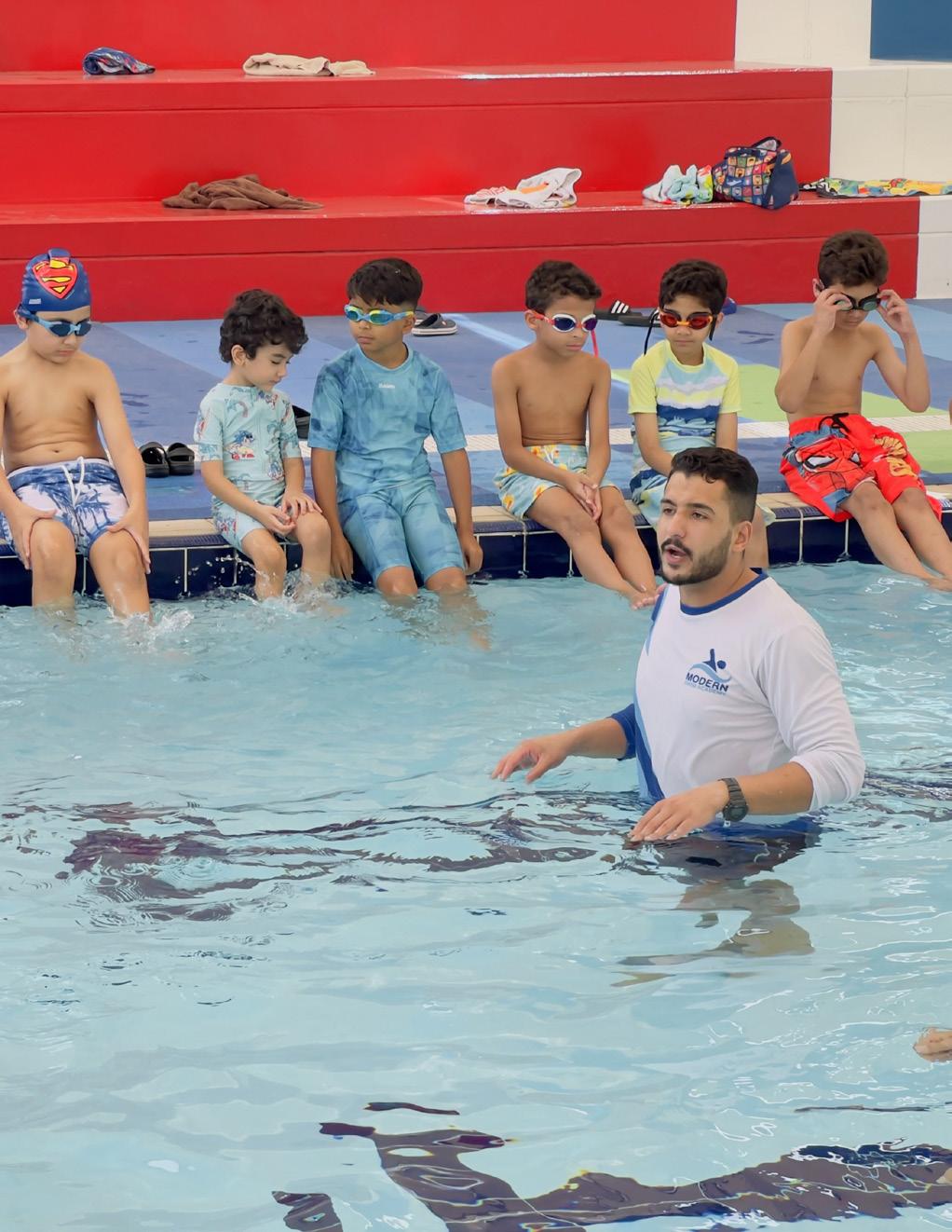
We’re receiving really positive feedback! Parents are noticing positive changes in their kids, and children are already asking when the next camp is.

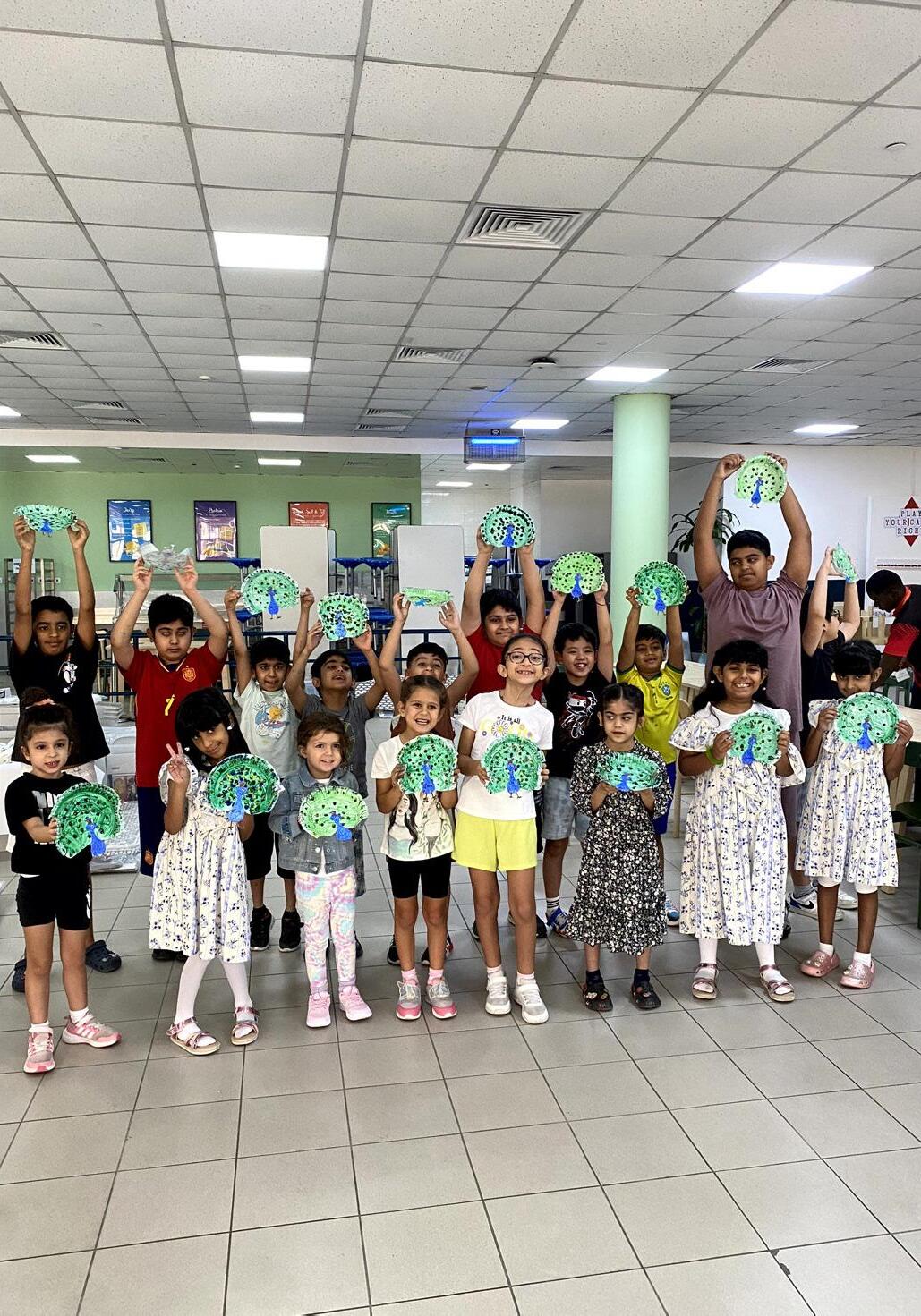

At Universal American School, it’s known as ‘Week Without Walls’. At Deira International School, it’s known as DIS On Tour. No matter what you call it, one thing is certain: international trips are an unforgettable part of school life.
And yep, the educational travel season is once again upon us. Deira International School has already commenced its local and international trips for students, with exciting
destinations such as London, UK (October) and Lisbon, Portugal (November), as well as a local adventure to Dibba, Fujairah (October). Meanwhile, Universal American School’s ‘Week Without Walls’ trips are set to begin from January 2025, with fun expeditions lined up to Kenya, Cambodia, Tanzania, Niseko in Japan, and a special Umrah pilgrimage to Saudi Arabia.
To keep parents in the loop and share all the fun moments, both schools have dedicated Instagram accounts for trips.

You can follow along at @disontour for Deira International School and @uasweekwithoutwalls for Universal American School. Expect plenty of photos, exciting updates, and behind-the-scenes snapshots so you won’t miss a thing while your children are off on their amazing adventures.
For many students, these trips are the highlight of their school life. While family vacations are fun, there’s something about traveling with school friends that adds an extra layer of excitement. But these trips aren’t just about fun—they’re opportunities for personal growth, cultural exchange, and hands-on learning.
Cherelle Pointon, a Science Teacher and Year 7 Learning Coordinator at Deira International School, has been a part of many of these adventures. A seasoned traveller, Cherelle recently accompanied a group of students to Kenya and has seen firsthand the transformative effect these trips can have. “Some of the most memorable experiences for students happen outside the classroom,” she says. “These trips push them out of their comfort zones. They face challenges, work together, and grow in ways that are hard to achieve in a regular school setting,” she says.



While family vacations are fun, there’s something about traveling with school friends that adds an extra layer of excitement. But these trips aren’t just about fun—they’re opportunities for personal growth, cultural exchange, and hands-on learning.
Chelsie Hemmings, Head of Secondary Performing Arts at Deira International School, adds that the trips also help students become better global citizens. “They get to explore a different part of the world and experience a new culture. Students gain fresh perspectives and take part in activities that aren't readily available to them,” she explains .


Reflecting on the recent trip to London, Chelsie shares how her students had the chance to engage in theatre and service opportunities that broadened their thinking. “The sporting and theatre opportunities in London were exceptional. For instance, our IB Theatre students watched two West End shows, which directly impacted their own ideas on how to stage and perform theatre. This has helped them aim for higher grades in their course,” Chelsie says.
The service activities on these trips are equally transformative. “During the London trip, students who took part in the service activity helped clear barns and fields and cared for animals that had been abused and rescued by a sanctuary,” Chelsie recalls. “It’s not something they would normally be exposed to, and it helped them think outside of themselves and see the immediate value of their work.”
As for the destinations, Cherelle explains that each one is carefully chosen to ensure students are gaining more than just stamps in their passports. “We want to provide experiences that align with


our educational philosophy and the CAS (Creativity, Activity, Service) framework. That’s why we choose destinations that offer a rich cultural experience and opportunities for students to engage with local communities,” she says.
One of Cherelle’s most memorable experiences was in Kenya, where students visited the Tumaini Women’s Group. “The students were deeply moved by the stories these women shared about their lives and challenges. One of our students even learned a traditional Kenyan song, ‘Jambo… Jambo Bwana’, and led the group in singing it. It was such a powerful moment of connection that really touched everyone,” she recalls.
Balancing education with fun is key to making these trips successful. “We try to create an experience that’s both enriching and enjoyable. For example, while our trip to Japan will include visits to cultural landmarks like the Sensoji Temple, we’ve also planned some skiing in Niseko to keep things exciting,” Cherelle explains.
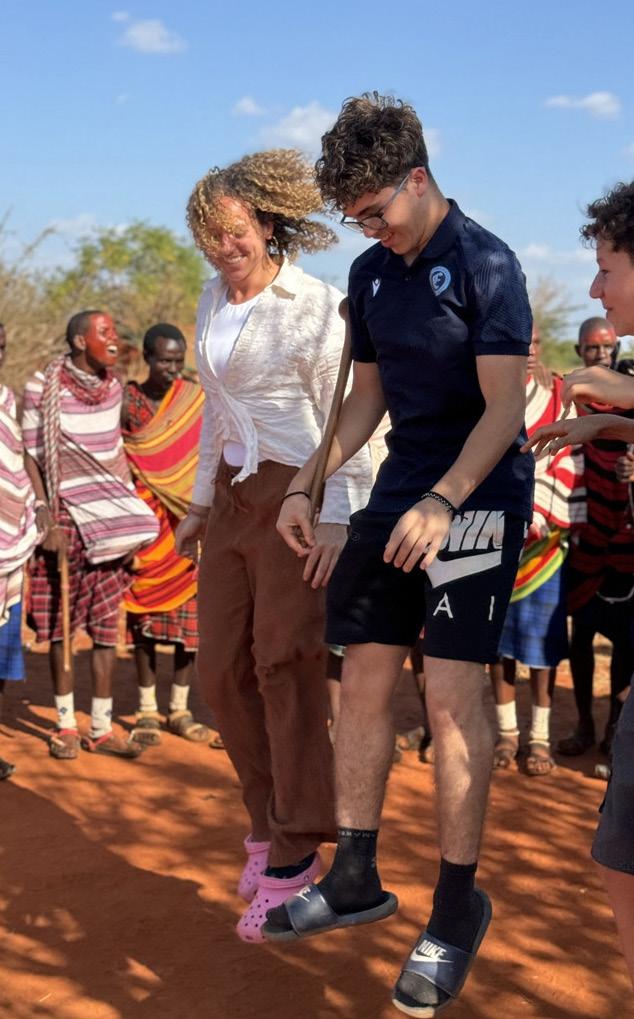
And the feedback from students and parents? Overwhelmingly positive. “Students come back with a greater sense of independence, a deeper understanding of the world, and stronger friendships. Parents love seeing


how much their children have grown during the trips, and that encourages us to keep refining the program,” Cherelle affirms.
For students like Tameem, an IB2 student at Deira International School, the memories from past trips are unforgettable. “The experience in Cambodia was amazing, traveling with all your friends and knowing you’re going to help a community brought a lot of joy,” he recalls, reflecting on the joy and fulfilment that come with both adventure and service.
Leya, a Year 11 student, was deeply impacted by her trip to Kenya. “Getting to experience and view the hardships and struggles that some communities in Kenya face daily with such a positive attitude allowed me to understand how truly grateful I should be.”




about your child’s journey to and from campus?
Our Head Driver shares a glimpse into his day and how he ensures everything runs smoothly—quite literally!
School bus safety is one of the most important things the Ministry of Education focuses on. Getting children to and from school safely requires careful planning and a lot of responsibility. In Dubai, there are many transport providers, like School Transport Services (STS), Fancy, Arab Falcon, and Maverick Group, who work hard to make sure students travel securely. At Universal American School, our trusted transport provider is Maverick, and we had the chance to sit down with Hassan Sardar, our Head Driver. He gave us a glimpse into his day and how he helps keep everything running smoothly—literally.
Hassan’s day kicks off early. “I wake up feeling fresh, take a quick shower, and get into my uniform. Then I take the shuttle bus to school,” he says. Once at UAS, he gets right to work. “The first thing I do is check the bus—engine, tires, everything. While the engine is warming up, I clean the outside, and my assistant takes care of the inside.”
He and his assistant have a solid routine, making sure the bus is spotless and ready for the morning pick-up trip. “Each bus has its own route, so we know where we’re going and who we’re picking up,” Hassan shares.
One of Hassan’s favourite parts of his job? The smiles he gets from parents and students during pick-up. “When I see the kids smiling and their parents greeting me with a ‘salam’ or ‘good morning,’ it feels great,” he says. “It makes my day better.”
Hassan treats the kids on his bus like his own. “I look out for them, and they are very respectful. They’re like my own children, and when they’re happy, I’m happy too.”
While Hassan enjoys his job, it’s not always easy. “Dubai roads can be unpredictable. Every day is different. There are always some drivers who are in a hurry, or road hazards that pop up. My job is to stay focused and keep the kids safe no matter what,” he explains. But the reward? “Seeing the kids get to school and back home safely is all I need to feel good about the day.”
Safety comes first, but Hassan says there’s always room for fun. “Safety of our students is always the top priority. All our buses are equipped with cameras and safety devices, allowing parents to receive real-time notifications through the Maverick Parent App, giving everyone peace of mind.”



“During the rides, the kids are always excited, and their energy is contagious. I love seeing their happy faces and making sure they have a good ride to school,” he enthuses.
Safety of our students is always the top priority. All our buses are equipped with cameras and safety devices.




“I used to dread the day my report cards arrived in the mail as I had undiagnosed dyslexia, and they rarely brought good news. Words like lazy, backwards, and below average often appeared alongside the letters D and E. But I’m so glad my grades didn’t define me, and I’ve learned so much more about the world, about business, and about all parts of life since leaving school. So, if you didn’t get the grades you wanted today, don’t let it get you down. Work out what you’d love to do, stay curious, take notes, and treat people well. Then no one will be too bothered by your grades.” - Sir Richard Branson, Founder of Kevin Dupont, Head of University & Careers Counselling at Deira International School, discusses the options available for those whose results don’t go as planned
ir Richard’s words resonate with many students today, especially those facing the uncertainty of not achieving their desired results.
But just as Branson found success beyond the classroom, students can take heart that there are multiple pathways to their goals.
Kevin Dupont, Head of University & Careers Counselling at Deira International School
We sat down with Kevin Dupont, Head of University & Careers Counselling at Deira International School, to discuss what happens next for students whose results didn’t go as planned.
Momentum: What are some practical steps that students can take if they don’t achieve the grades they were aiming for in their final exams?
Dupont: Not achieving your intended exam grades is not the end—it’s just the start of a different path. At Deira International School (DIS), we always encourage students to maintain a proactive mindset.

The first step is to assess the situation calmly and understand where the gaps were. Was it a lack of understanding in certain topics, poor exam technique, or external factors affecting performance? Once identified, students should consult with their teachers and our counselling team to explore options like retaking exams or considering alternative qualifications that align with their interests and strengths. It’s also important to reassess their subject choices and determine the best way forward.
Momentum: How can students explore alternative pathways to reach their academic and career goals if their exam results fall short of expectations?
Dupont: There are many roads to success, and sometimes a detour can lead to an even better destination. Students should broaden their perspective on what’s available. At DIS, we introduce students to a variety of pathways beyond traditional university routes. This includes foundation programmes, university courses with work placements, internships, or even starting their careers directly in industries that value skills over grades. Our counselling team works closely with students to identify their passions and match them to alternative pathways, such as universities with flexible entry requirements, vocational training, or work-study opportunities.
Momentum: Can you share some examples of how students have successfully navigated their next steps after receiving lower-than-expected exam results?
Dupont: One of our students was determined to study engineering but didn’t meet the grade requirements for her first-choice university. She opted for a foundation year in engineering, which not only improved her academic skills but also provided valuable industry experience through internships. Another student, who discovered a passion for the culinary arts, completed a preparatory year in Dubai to build her skills before pursuing a specialised course abroad. Today, both are thriving in their fields, proving there are many ways to reach your goals.
Momentum: What support systems are available at DIS for students who may feel discouraged by their exam performance?
Dupont: At DIS, we have a robust support system to help students through these challenges. Our University & Careers Counselling team offers one-on-one sessions to help students process their emotions, explore their options, and create actionable plans. We also have dedicated teachers who provide academic support and workshops on study skills and exam techniques. Additionally, we offer access to mental health resources, including counselling services, to help students manage stress and build resilience.
Momentum: How can parents and educators help students manage the emotional impact of not achieving their desired grades while still encouraging them to look ahead positively?
Dupont: It’s crucial for parents and educators to provide a balanced perspective. While it’s natural to feel disappointed, it’s important to reinforce that grades don’t define a person’s potential or future. Parents should be supportive, helping their children reflect constructively on what they can learn from the experience.
Educators, on the other hand, should focus on fostering a growth mindset, encouraging students to see setbacks as opportunities for development.

At DIS, we emphasise effort and perseverance as much as outcomes, helping students stay motivated and optimistic about their futures.





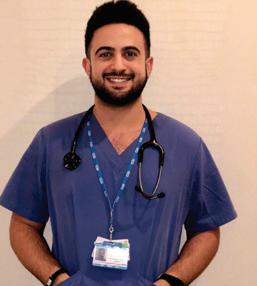
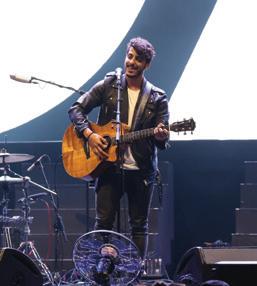






Yes, that beloved UAE brand for mamas is a creation of Holly, a proud UAS alumna!
Holly pictured with her husband, Kyle. They are proud parents of four young children, Mirren (11), Scarlett (10), Kain (8), and Jack (7).
Born in the United Kingdom and raised in the Middle East, I spent my younger years growing up in Muscat, Oman, and Dubai, UAE. My educational journey brought me to Universal American School, where I graduated as a founding student in 2008.
My career began with co-founding the region’s largest community group for mothers, laying the foundation for my passion of supporting mothers across the region. Currently, I serve as the Head of Brand for Mumzworld.com, where we support over 3 million mothers across the Middle East.
Mumzworld is one of the few companies that truly values motherhood as an asset, offering the flexibility needed to balance professional and personal life. My role allows me to combine my professional expertise with my passion for motherhood, creating a fulfilling and impactful career. My purpose is to champion and support the role of mothers in the region, helping them navigate the complexities of modern parenthood.
Balancing a busy professional life with the joys and challenges of raising a family has provided me with firsthand experience and empathy for the mothers I support through my work
Having recently relocated back to the UK, I now manage my responsibilities remotely. This experience in remote work has provided me with unique insights into achieving a better work-life balance, which resonates with many professionals seeking similar opportunities.
In addition to my primary role, I am actively involved in numerous initiatives and partnerships aimed at supporting mothers and their surrounding communities. Reinforcing the importance of community and connection when it comes to raising the next generation.
Dubai remains a significant part of my professional journey, providing a dynamic and diverse backdrop for my career. The city’s welcoming atmosphere and safety make it an ideal place for raising a family and meeting people from all walks of life.
On the personal front, I am a proud mother of four young children: Mirren (11), Scarlett (10), Kain (8), and Jack (7). Balancing a busy professional life with the joys and challenges of raising a family has provided me with firsthand experience and empathy for the mothers I support through my work.

Read how UAS alumni sisters, Layan and Nour Amkieh, are bringing the Arab diaspora together with Mazikka
Meet Layan and Nour Amkieh—two sisters, two stories, and one incredible shared mission. Both are proud alumni of Universal American School, and their love for their Arab-Syrian heritage has blossomed into something truly remarkable.
Layan, the owner and founder of Mazikka, along with her sister Nour, co-founder and expert in ethnomusicology and marketing, are on a mission to bring the Arab diaspora together through music and community spaces. Our reporter Farida Eltigi sat down with the sisters to talk about their journey from UAS to founding Mazikka, and what’s next for them.


Farida: Let’s start by getting to know you both! Tell us a bit about your time at UAS and how it shaped who you are today.
Layan: UAS was really where everything began. It felt like the birthplace of my creativity, my ideas, and even my sense of home. Growing up as an expat in the UAE, being part of an international school like UAS shaped us in ways that are hard to describe. It gave us a sense of belonging, even when we were far from our homeland.
The diversity in the school, our incredible teachers from all over the world, and the connections we made with people from different backgrounds—it all shaped the work I do now.
I work to create spaces for people who, like me, are searching for that feeling of “home” away from home.
Nour: Definitely, UAS was where we learned to connect with others who were also navigating life as expats. It gave us the hope and ambition to build a community, and that sense of community is at the heart of what we’re doing with Mazikka today.
Farida: So, what sparked the idea for Mazikka? What’s the story behind it?
Nour: Mazikka really came from a personal need—our need to create a space where our Arab-Syrian identity could be fully visible and celebrated without fear or risk.
It’s about finding a place that feels like home, a place where we could relax and be ourselves. But it’s also about more than just us. We saw a much bigger need for a space where the Arab diaspora, with all its different faces—old, young, conservative, liberal, Muslim, Christian—could come together.
Mazikka is proof that we can celebrate our differences and still find joy in what unites us.
Farida: Where do you see Mazikka going in the future?
Layan: Our dream is to take Mazikka to as many places as the diaspora needs us.

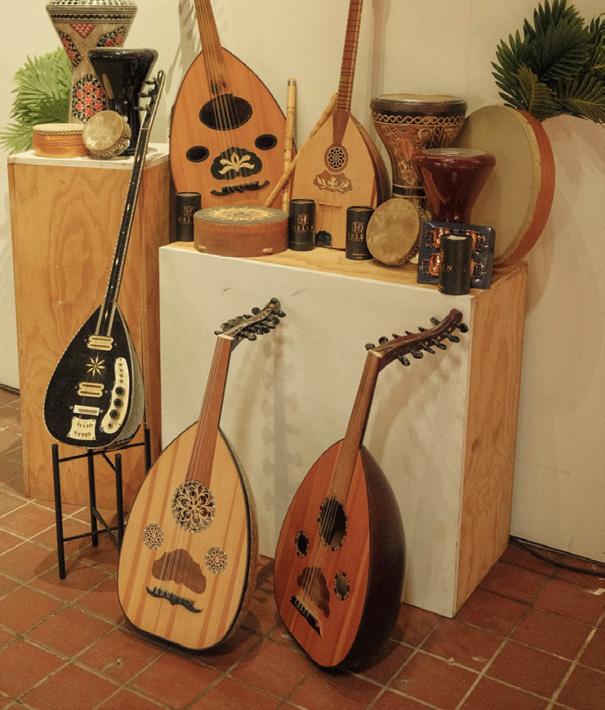


Being ‘Irish twins’ means Samar Sharif and her brother Rashed share a special bond—so close, they were born in the same year. That’s right! Less than 12 months apart, making them more than just siblings, but near-twins in everything, including their shared love for art, design, and of course, cartoons.
Samar Sharif, a 2014 graduate of Universal American School, has always had a flair for creativity.
Growing up, she and Rashed were glued to cartoons— not just for the stories, but for the colourful animation and artwork that filled the screen. They’d hit pause on scenes they loved and spend hours recreating them with their own artistic twist. This shared love for cartoons fuelled their passion for drawing and design, inspiring both of them to pursue creative careers.



Fuelled by the artistic spark she shared with her brother from childhood, Samar and Rashed embarked on a new venture: Neartwins, inspired by their love of cartoons, art, and creativity
Samar carried this love with her as she pursued interior design at the American University of Sharjah before heading to Italy to master furniture design at the Florence Institute of Design International. Italy, with its rich history in architecture and art, was a playground for Samar, who spent her free time exploring the designs and cultures of Europe.
Upon completing her master’s, Samar returned to the UAE and immersed herself in the world of interior design. She spent a year working as a furniture designer for a residential design company, before moving into the world of retail
design—where she has been crafting spaces and transforming retail environments across the UAE for the past three years.
But Samar’s story doesn’t end there. Fuelled by the artistic spark she shared with her brother from childhood, Samar and Rashed embarked on a new venture: Neartwins. Inspired by their love of cartoons, art, and creativity, the brand is a playful, nostalgic nod to their artistic roots. “Growing up, we’d pause scenes from cartoons and sketch them out together,” Samar recalls.
“It was always about the art and animation, more than the storyline for us. We wanted to capture that magic and bring it to life.”
Neartwins, a clothing brand born from the sibling duo’s collective imagination, was launched at SOLE DXB 2023, a major streetwear event in Dubai. The quirky, rebellious mascots ‘R’ and ‘S’—representing the initials of Rashed and Samar—are at the heart of the brand.
John
Teaching is an evolving journey, and at Universal American School and Deira International School, it’s not just about marking homework or giving lectures—it’s about staying ahead of the game.
To help teachers stay sharp, the Al-Futtaim Education Foundation introduced a dynamic training programme for Arabic and Islamic studies teachers. Led by John Rodenhurst, Assistant Professor at the University of Birmingham in Dubai, this programme is creating a real impact.
John Rodenhurst told Momentum that the programme stands out due to the collaborative energy of the participants.

"This focus on shared experiences and insights is particularly beneficial in the context of Arabic and Islamic studies, where cultural and contextual understanding is paramount"
“The teachers bring fresh ideas to action research,” he shares. “This year’s group is incredibly eager to share their experiences, and since they work in similar environments, their insights are often spoton. It’s very different from other programmes I’ve led, where there’s usually more variety in the educational backgrounds.” This collective approach creates a supportive space where teachers can exchange ideas, a major bonus in Arabic and Islamic studies, where understanding cultural nuances is key.
Rodenhurst explains that the success of the programme is seen through better student performance, more satisfied teachers, and the introduction of new teaching strategies in the classroom. “It’s fantastic to see how the teachers are building a community, constantly growing, and sharing their discoveries. Feedback from past participants shows that the impact is real.”
Teachers don’t just walk away with personal improvements— they contribute to a wider pool of knowledge, enhancing education across the board at both schools.
Now in its third cycle, the programme has evolved to meet the specific goals of the AFEF schools. “This year, we’ve focused more on aligning with the educational objectives of the schools, which also influenced our choice of participants,” Rodenhurst adds. These adjustments ensure that the programme remains relevant and impactful, directly supporting the schools’ mission of academic excellence.
Beyond benefiting just the teachers and students at these schools, Rodenhurst believes this programme has the potential to shape the future of education in Islamic and Arabic studies. “Action research adds valuable voices to the field—especially those of busy teachers and support staff, whose input is often overlooked. I hope our findings inspire other schools and teachers to contribute their experiences as well. There’s always more to learn in education.


“As an Arabic teacher at Deira International School, the action research training has significantly shaped my teaching, particularly in improving reading skills among young learners. It also sharpened my research and data analysis skills, which I applied to create a phonics intervention box for struggling readers.
By adapting the intervention, I can meet the specific needs of each student, making the process more effective. For instance, I implemented a 5-minute Arabic phonics session for a Year 1 student on the SEND register, who has since shown noticeable progress in focus and phonetic knowledge. I continuously evaluate and refine my approach, and this process has proven the impact of brief, targeted sessions on student learning.
The training also helped me integrate local cultural elements into my lessons while maintaining high academic standards. This approach has deepened my students’ connection to Arabic and sparked their interest in learning.

Momentum: What skills or knowledge from the Birmingham University training have enhanced your teaching the most?
Hatem: The training focused on inquiry and reflection, helping me make evidencebased decisions in the classroom. I now use strategies like flipped classrooms and peer-assisted learning, and I’m better at solving teaching challenges with data-driven methods.
Momentum: How have you applied this in your classroom?
Hatem: I used the Reading Age program to help students improve their reading fluency. By tailoring activities to their specific needs, I saw an increase in their reading speed and accuracy. They became more engaged, and their fluency scores steadily improved.
Momentum: How do you see this training shaping your future goals?
Hatem: It’s given me a strong foundation to keep improving my teaching methods. My goals are to boost student engagement, encourage critical thinking, and promote cultural understanding in my lessons.

“My name is Fatema Daadouch, and I teach Arabic at Deira International School. The action research training at Birmingham University has significantly enhanced my teaching skills, allowing me to create more engaging and culturally relevant lessons for my students.
One of the most valuable skills I gained was designing a curriculum that helps Year 1 students improve their speaking abilities through fun, culturally rich activities. These methods make learning enjoyable while boosting their appreciation and use of the Arabic language. I also learned how to create assessments that truly measure student progress, giving me the tools to provide effective feedback and keep students motivated.
Using what I learned, I introduced interactive storytelling in my Year 1 class. The students would retell stories and act out characters, making the experience engaging while encouraging them to practice speaking.
Over time, their confidence grew, and their Arabic verbal fluency improved. The supportive environment I created allowed them to feel comfortable expressing themselves and taking risks with the language.
The training also helped me embrace the cultural diversity of my students, who come from various countries. I created a space where they feel comfortable sharing their perspectives and dialects, enriching the overall learning experience while maintaining high academic standards through continuous assessment. This training has laid the groundwork for my professional growth. I plan to keep refining my teaching methods, enhance student engagement, and eventually take on leadership roles where I can contribute to educational practices and research on a larger scale.”
How DIS teachers are on a mission to save students’ focus, one swipe at a time
PING! That’s the all-too-familiar sound teachers hear mid-lesson when a phone notification goes off. And it doesn’t matter whether the student is knee-deep in a math equation or engaged in a riveting discussion on Shakespeare—one ping, and attention is shattered like a dropped iPhone screen.
Four years ago, Deira International School took a bold step to reclaim classroom focus by banning phones from students’ hands during lessons. “It’s about minimising distractions and enhancing focus,” says Douglas Pettitt, the Secondary Head Teacher at DIS.
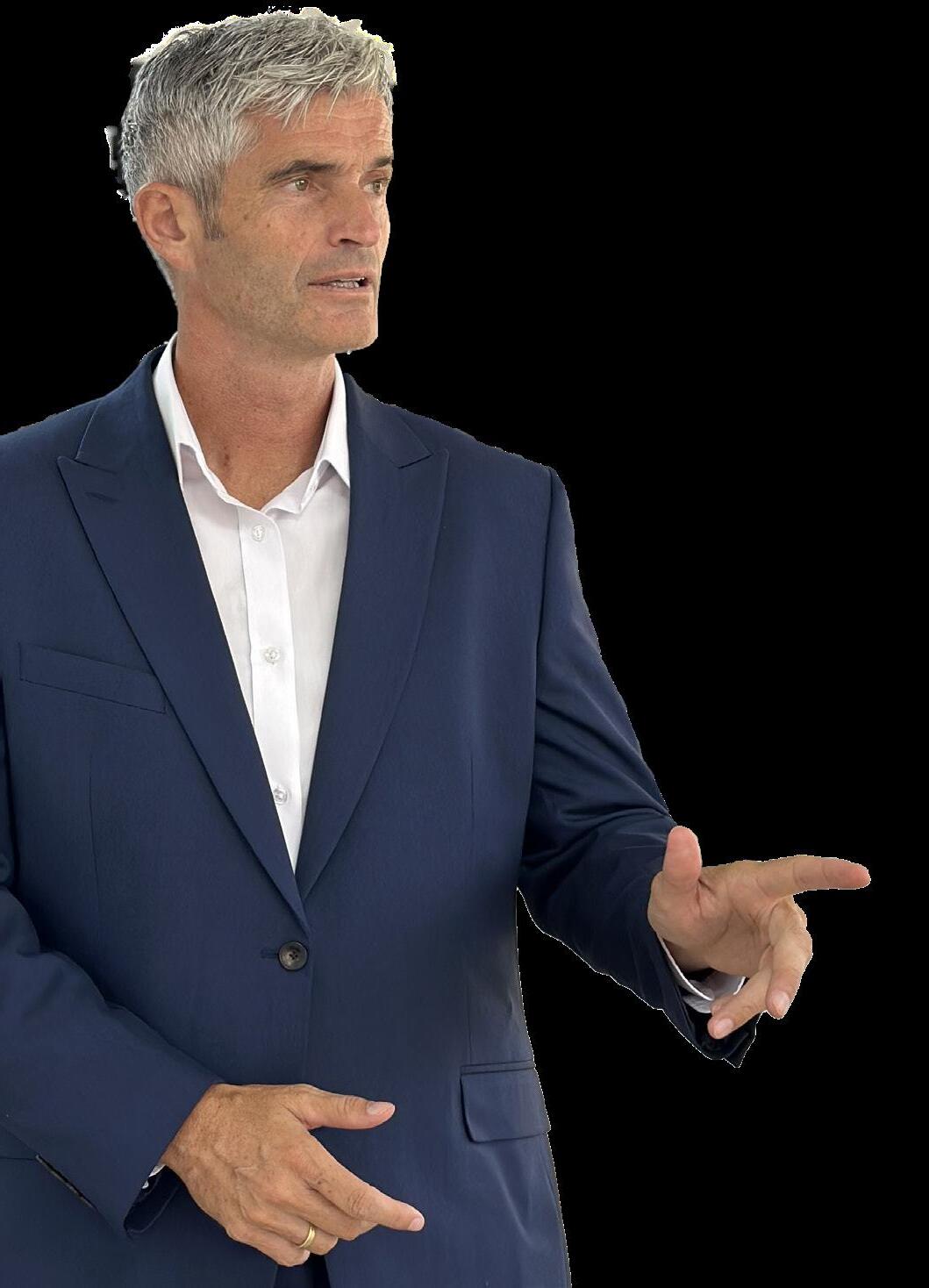
Of course, this decision hasn’t exactly won the Parent of the Year award.
Some parents have voiced concerns about not being able to reach their kids during the school day. We get it—what if little Ahmed suddenly needs to be told he forgot his P.E. kit at home? DIS’s answer? A classic solution from the pre-smartphone era: call the school office. “Parents can contact the school, and we’ll pass on the message to their child, promptly,” Pettitt explains, as a matter-of-

So how do you keep tech-savvy teens from sneaking in a quick scroll under the desk? DIS has it covered. They’ve posted reminders all over the school just in case anyone forgot that phones are a no-go in class. Teachers are the first line of defence, keeping eagle eyes peeled for a sneaky WhatsApp session. The moment a phone appears, it’s whisked away faster than a magic trick. Confiscated phones are locked away in the office, only to be freed at the end of the day—much like a jailbreak, but with fewer criminal undertones. And yes, parents are notified about the mischief via Go4Schools.

You’d think students would riot in the halls, but surprisingly, the response has been pretty chill. In fact, since the ban was introduced four years ago, teachers have noticed some pleasant side effects—like students actively participating in class discussions. Turns out, when you take away TikTok, the only thing left to focus on is the lesson!
Pettitt shares that the overall engagement has improved over the years, and students are more tuned in than a radio at full volume. It’s not just about better grades either—teachers are finding it a lot easier to keep attention in check.
Douglas Pettitt, Secondary Head Teacher at Deira International School
So, PING! Just like that, the classrooms at DIS have found peace, quiet, and a renewed sense of focus. Sure, students might not love parting with their beloved devices, but they’ll survive—just like the generations before them who somehow made it through school without a smartphone in sight.
Read how the IBCP at Deira International School is shaping future professionals
It’s the holidays. Some students are currently on work placements, while others have received offers from top universities around the world.
These are the success stories of Deira International School’s IBCP programme, which blends academic learning with hands-on career training. Kimberley Shaw, IB Careers Teacher and IBCP/BTEC Coordinator, explains how the programme prepares students for both higher education and the workforce.
“The IBCP offers students a mix of academic and practical learning,” Kimberley says. “Unlike the IB Diploma Programme (IBDP), which is purely academic, the IBCP includes career training through BTECs, where students learn practical skills. Additionally, students complete projects and assignments, which makes the learning more hands-on.”
She adds, “We tailor the programme to each student’s interests, allowing them to focus on a career path while also studying IB Diploma subjects.”



Core parts of the IBCP, such as Personal and Professional Skills (PPS), Service Learning, the Reflective Project, and Language Development, also help students develop critical thinking and problem-solving skills.
This year has been a standout for IBCP students at DIS. “Our students have achieved an average BTEC grade of D*D* (highest possible attainment), and many have secured work placements with the Al-Futtaim Group, where they’re gaining valuable job experience,” Kimberley shares.
In addition to their academic work, students have engaged in service-learning projects, giving back to the community while developing a sense of social responsibility. “These achievements highlight the programme’s ability to prepare students for both higher education and the workplace,” she adds.
The IBCP offers a unique combination of academic study and real-world experience. “Students take IB Diploma courses alongside their BTEC studies, and they also participate in weekly work placements. This approach prepares them for future careers by giving them practical skills in their chosen fields,” Kimberley explains.
Core parts of the IBCP, such as Personal and Professional Skills (PPS), Service Learning, the Reflective Project, and Language Development, also help students develop critical thinking and problem-solving skills.
Al-Futtaim Group internship opportunities bridging the gap between academic learning and practical experience

Summer holidays are always an exciting time for our students, each choosing their own unique adventure.
While some seized the opportunity to explore the world or reconnect with family in their home countries, others decided to roll up their sleeves and dive into the working world.
This is one of the many perks of being part of the Al-Futtaim Group. Our students from Deira International School and Universal American School get to transform their classroom knowledge into real-world skills through internships within the Al-Futtaim Group.
These internships offer hands-on experience across various divisions, including Education, Automotive, Retail, Financial Services, IT, Real Estate, Health, Engineering and many more... This collaboration gives our students a chance to explore different career paths and enrich their education with practical learning.
In the intervening pages of this edition of Momentum magazine, we introduce you to a group of students who’ve embraced this opportunity. They share their stories about their internships, guided by dedicated mentors and supervisors.
Alma Sabbah, the Experiential Learning Manager at Al-Futtaim Education Foundation, plays a key role in connecting our students and alumni with these valuable work experiences, helping them build a bridge between their studies and future careers.


"Collaborating with my fellow intern, Sama, really improved my problem-solving abilities," says Myra.

Walking into the world of Enterprise Risk Management (ERM), I wasn’t sure what to expect. I had some idea of what it involved, but nothing prepared me for the complexity of keeping risks in check. My internship at Al-Futtaim Group’s ERM department gave me hands-on experience with the CAMMS system and sharpened my teamwork and communication skills.
One of the most valuable parts of the internship was working closely with my mentor, Shaikha. She was always there to clear up any confusion, whether I was trying to identify different risks or dealing with technical issues like accessing the CAMMS system. Her support made everything a lot easier to handle, and I felt more confident with every task.
I also had the chance to meet with other departments, which gave me a better understanding of how ERM interacts with the rest of the company. Seeing how important risk management is to the success of a business really opened my eyes. Whether it was looking at reputational risks or figuring out ways to handle incidents, the experience showed me how every part of a company is connected. The internship taught me more than just technical skills. Collaborating with my fellow intern, Sama, really improved my problem-solving abilities. We worked together to find solutions, share ideas, and figure out how to manage the challenges that came our way. - Myra
Risks are everywhere, but most of the time, we don’t even notice them! That was one of the biggest lessons I learned during my internship at Al-Futtaim Group’s ERM department.
Identifying risks, especially in places like schools, was overwhelming at first, but with time and practice, I started to see things differently. One of the highlights was visiting Universal American School with the compliance team to conduct a risk assessment. At first, we were all a bit confused, but with our mentor Joyce Nicodeme guiding us, we learned to spot hidden risks through the eyes of a professional. Working alongside other interns also helped me catch things I would’ve missed on my own.
I got hands-on experience with systems like Eramba and CAMMS and learned how to assess everything from business risks to reputational ones. This internship really strengthened my skills and gave me a solid foundation in enterprise risk management. I’m excited to carry these lessons forward into my future career. - Sama

You know that zig-zaggy pathway you have to follow in an IKEA storeroom? Well, it’s all intentional!

Let me let you in on a little secret. Do you find it somewhat confusing, that zig-zaggy pathway you have to follow in an IKEA storeroom? Well, it’s all intentional!
During my 10-day internship, I learned how IKEA’s store layout is designed to expose customers to more products as they navigate the store, increasing the chances of additional purchases.
I also discovered how IKEA strategically places products within a 5–10-metre range, ensuring customers always have items in their line of sight, boosting engagement and sales. These clever techniques taught me the psychology behind consumer behaviour and the importance of strategic retail design. Now you know.
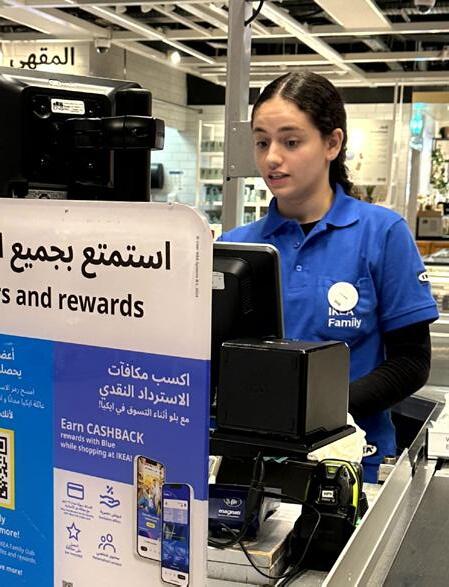

If you think being a cashier is just scanning barcodes, think again. During my internship at IKEA, I quickly learned that managing a register—especially during peak hours—is a real test of speed, accuracy, and staying calm under pressure.
Along with working at the information desk and in the return and exchange department, I had to handle a variety of customer inquiries and resolve issues on the spot.
One memorable moment was when I helped solve a tricky return issue involving a damaged item. By working with different departments and offering creative solutions, I turned the situation around, leaving the customer happy and earning recognition from my supervisors. This experience taught me the value of adaptability, communication, and problem-solving.

Picture this: New intern. An angry customer walks in. The problem? The sofa they bought didn’t fit in their living room. As nervous as I was, I stayed calm, listened carefully, and suggested a smaller sofa that would fit better. I even arranged for a same-day delivery swap, turning their frustration into relief. This was just one of many valuable lessons I learned during my three-week internship at IKEA. In customer relations, I worked at the exchange and return desk, cashier, front desk, and even the kids’ play area. Each role taught me something new—whether it was handling high-pressure situations or improving my communication skills with both customers and colleagues. As a cashier, I focused on efficiency and accuracy, and working with children in the play area was a fun challenge that required patience and attentiveness.
In my final week in the sales department, I learned to match customers with the right products, explaining features and benefits in the sofas, kitchen, and tables sections. It was a great opportunity to improve my sales skills and product knowledge, especially in the kitchen section, where teamwork and customer guidance were key. Overall, my internship at IKEA gave me practical experience in customer service and sales, confirmed my interest in business, and left me more confident in my skills.


Here’s a funny one about how I earned my first tip. I noticed that a customer couldn’t fit all their products into their trolley, so I brought them a bigger one. To my surprise, the customer thanked me and even offered me a tip! This simple interaction made me realise how rewarding it can be to help others, and it’s a takeaway I’ll carry with me into future opportunities.
During my time at IKEA, I worked in the Sales department, assisting customers and helping with tasks like home deliveries. I got a real feel for the work environment, learning valuable skills in communication and teamwork. The support from my coworkers, who were always friendly and helpful, made a big difference in my experience. Of course, I made a few mistakes too—like the time I brought the wrong product during my first few days. But it taught me that making mistakes is part of the learning process, and I improved as I went along.


Turns out, pillows and curtains have their own personalities, and I spent two weeks getting to know them. During my internship at IKEA, I was thrown into the home textiles section, organising merchandise and helping customers find just the right fabrics to match their dream living rooms. I quickly realised that behind every neatly arranged display is a whirlwind of planning and effort.
My responsibilities weren’t just about keeping things tidy—I learned how to assist customers, manage stock, and work in a fast-paced retail environment. One of the biggest challenges was memorising IKEA’s massive product range, but after a few days, I was confidently guiding customers through their options.
This internship gave me a behind-the-scenes look at how IKEA runs smoothly and taught me the importance of teamwork. I walked away with new confidence and skills that I’ll carry into my future career.
Open the wallet. This is a real thing at IKEA. Do you notice how some items on the shelves literally call you to purchase them? That’s part of IKEA’s strategy.
During my internship, I learned about ‘Breath Taking Items’ (BTIs), highlighted in yellow to catch attention with low prices, while premium products are displayed on black backgrounds to signal high quality. IKEA even uses green labels for environmentally friendly items, showing their focus on sustainability.
At first, I struggled with helping customers find products, often turning to my senior co-workers for help. But by the second week, I was confidently guiding customers and solving issues on my own. My mentors in Home Organisation taught me how to engage with customers, offer support, and always make them feel welcome.
This experience gave me a deep understanding of sales strategies, customer service, and what it’s like to work in a fast-paced retail environment. I’m grateful to the Al-Futtaim Education Foundation and Deira International School for giving me this incredible opportunity.

Here’s what Ramy discovered working with elevators and escalators
I never would have guessed that there were so many steps (pun intended) involved with the process of selling a single elevator! During my internship in the Al-Futtaim Group’s Mechanical Engineering division, I learned how each department—sales, pre-sales, installation, and maintenance— works together to get the job done.
I learned about legal documents, project estimations, and how different elevator specifications impact the final product. But what fascinated me most was the installation process and how elevators actually work. As someone hoping to pursue mechanical engineering, this hands-on experience was exactly what I was looking for.
One of my favourite parts was visiting elevator installation sites. Seeing the process in real life helped me connect the theory I learned in the office to the practical work happening on-site. My mentors were always helpful, answering questions and explaining everything in detail.
Of course, it wasn’t all smooth rides— sometimes the sheer amount of information was overwhelming. Without prior experience in many of these areas, I had to work hard to absorb everything, taking notes and reviewing documents to keep up.
I’m glad I took this opportunity and gained knowledge I now see as essential.


Sorting through over 50 CVs to find the top five candidates? Let’s just say, It’s like hunting for a unicorn... but with a LinkedIn profile!
I found myself staring at nearly ten equally qualified candidates and had to dig deep into my critical thinking toolkit to make the best decision. Talk about pressure!
“The Talent Acquisition team was incredibly welcoming, and my mentor, Adeeb Kazi, made the experience feel more like a learning adventure than a job, says Tala
I interned with the Talent Acquisition (TA) team at Al-Futtaim Group’s HR department. On my first day, I was so nervous that I showed up 30 minutes early, thinking that would impress everyone. Thankfully, the team was incredibly welcoming, and my mentor, Adeeb Kazi, made the experience feel more like a learning adventure than a job.
One of the coolest tasks I worked on was creating a PowerPoint presentation to convince hiring managers why a particular candidate was perfect for the role. I also got to design my own CV, with Adeeb giving me insider tips on what


makes it stand out to employers. Let’s just say my CV game is on point now!
The decision-making process wasn’t easy—especially when faced with a pile of CVs, all from amazing candidates. This pushed me to think critically and dig beyond the surface to find the perfect fit. It wasn’t just about the qualifications; I had to really understand what the company needed and match it with the right person.

Throughout the internship, I sharpened my communication skills and learned how to give and receive feedback effectively. I also got a crash course in recruitment strategies, problemsolving, and how to work under tight deadlines. It taught me the importance of attention to detail and perseverance, even when the workload was overwhelming. - Tala
Balancing Oxford’s historic halls and Al-Futtaim’s HR scene, this is Bashayer’s ultimate internship experience
This past summer turned out to be far more eventful than I expected! My plan was to focus solely on my internship at Al-Futtaim Group, but then my mom came in with a wildcard: the Oxford Summer School, in the UK. Two major events in one summer? I wasn’t sure if I’d love it or feel completely overwhelmed. Spoiler: it was a bit of both— and I wouldn’t change a thing! (Pro tip: Always have a plan for your summer—you might be surprised at where it takes you!)
Oxford felt like stepping into a different world. The ancient buildings and rich history were awe-inspiring. Being away from my close-knit family for two weeks was a big adjustment, but it gave me a sense of independence.
Managing a budget was also a new experience—I had to carefully decide how to spend on essentials and keep enough for weekend adventures! It taught me a lot about prioritising my spending and being financially mindful. The experience wasn’t just academic; I made friends from across the globe, soaked in Oxford’s incredible atmosphere, and had the nerve-wracking honour of delivering a graduation speech. Speaking to such a large audience pushed me out of my comfort zone and gave me a huge confidence boost.
Then came my internship at Al-Futtaim Real Estate, where the excitement only grew. I discovered the real magic happens behind the scenes—like

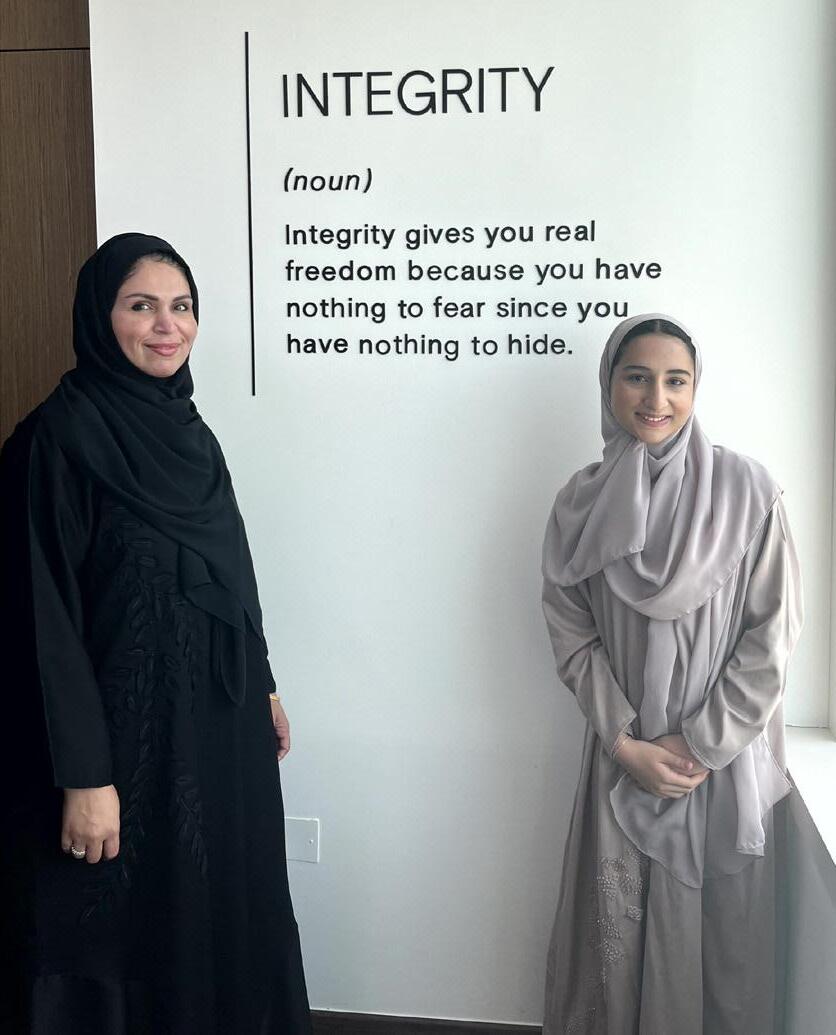
juggling CVs, setting up interviews, and getting a front-row seat to the recruitment process. One of the best parts was being part of meetings about Emiratisation and sharing my thoughts. I even got to work with the design and media teams to create certificates and LinkedIn profiles for other interns, which was a blast.
Even with the packed schedule, I didn’t miss out on fun. I celebrated my GCSE results, spent quality time with friends, and explored other cities in the UK. It was the perfect mix of personal growth, work, and relaxation.
Looking back, the experience at both Oxford and Al-Futtaim Group equipped me with skills that will serve me well in the future, particularly in HR.
Are you ready for this?
I got to participate in the handover stage for Market Island, the largest food hall in the Middle East, and even conducted an inspection for a potential renovation at Dubai Festival City Mall!
I gained invaluable insights into the real estate construction industry, especially learning about the RIBA Plan of Work, which outlines the key stages of a construction project.
Talk about a hands-on experience. I gained invaluable insights into the real estate construction industry, especially learning about the RIBA Plan of Work, which outlines the key stages of a construction project. Big deal? Absolutely! What a superb foundation for my future career in architecture.
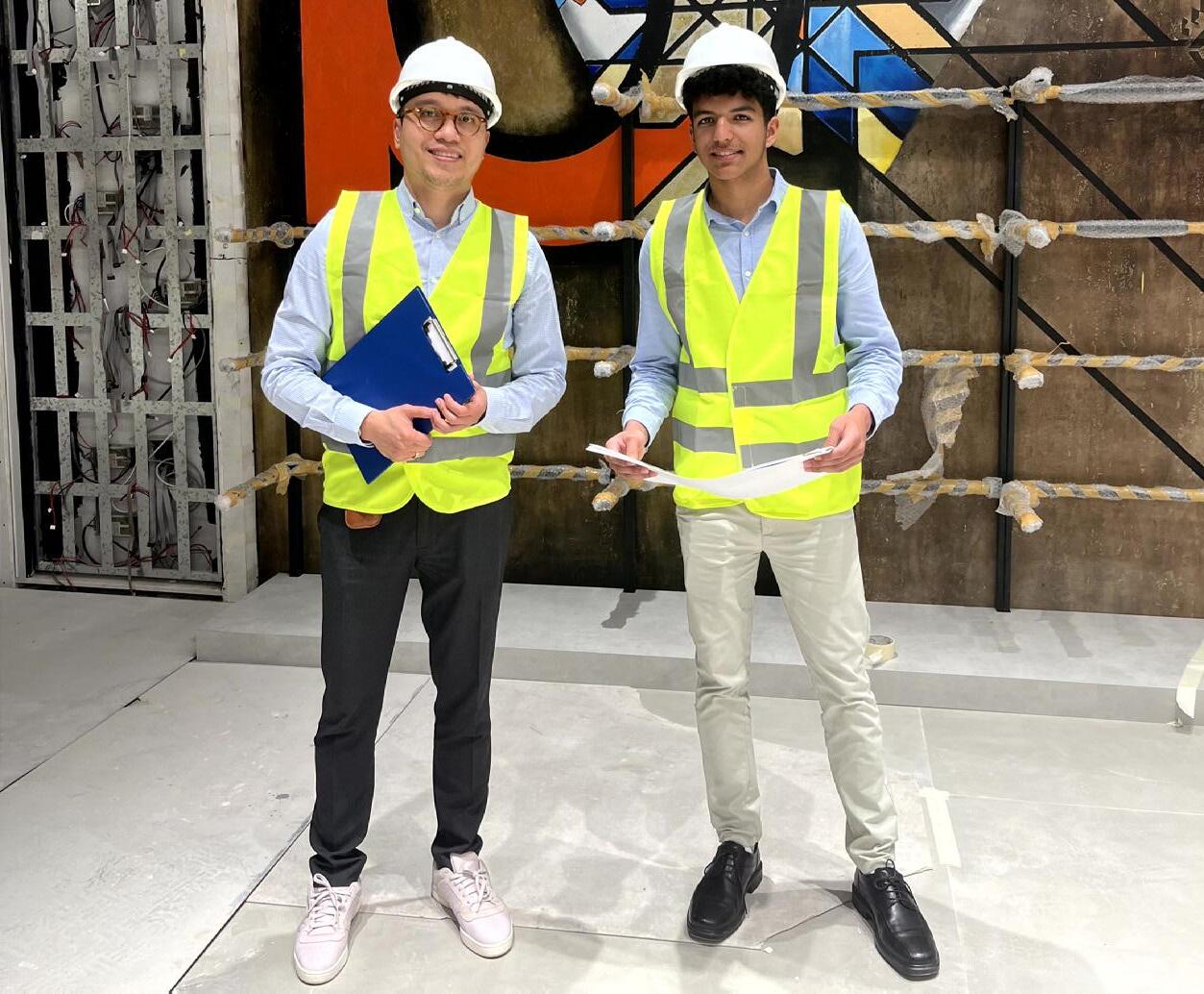


One of the most eye-opening lessons was seeing the complex side of real estate—like disputes between tenants and owners and the challenges that come with construction.
When my supervisor went on leave in the second week, I had to step up, become self-reliant, and dive into independent research. It was a challenge, but it helped me grow and learn.
This internship gave me the confidence to pursue a career in real estate and construction. Plus, I got to interact with architects, contractors, and clients, which sharpened my communication skills.
Overall, it was an incredible experience that laid the groundwork for my future! - Mohsin

Real estate is a somewhat niche interest, but it’s something I’ve been passionate about since I was young. That’s why I chose this internship, and I’m glad I did.
Working at Al-Futtaim Real Estate gave me the chance to explore different departments like finance, facility management, sales, and leasing.
Throughout the internship, I gained a lot of knowledge about key areas in the industry. I learned about Ejari, tenant relations, lease agreements and renewals, local purchase orders, and the costs of financing. The experienced employees were great at explaining things and giving me insights into how everything fits together.
Each day brought something new, from analysing rate cards to understanding lease renewals, and it gave me a real appreciation for how much goes into managing real estate in Dubai.
This experience not only deepened my understanding of the industry but also gave me valuable skills for the future. - Fadhil
And guess what? I got to experience all the behind-the-scenes operations that come together to make the mall experience seamless for customers. From Crisis Management and Assets Management to Events and Safety Protocols, I got to see how every department plays a vital role in keeping things running smoothly.
Throughout my internship at Dubai Festival City Mall, I learned how important coordination is across different teams. I witnessed firsthand how crisis situations are managed, how events are organised, and how safety protocols are enforced to ensure visitors have a great experience. I even got the chance to deal with customer issues at the Lost and Found department, which taught me the importance of communication and patience.
As I approach my senior year, this experience opened my eyes to so many career possibilities. It gave me a solid understanding of how malls operate, and it strengthened my skills in teamwork, communication, and strategic planning. The pressure that management faces, especially during emergencies, showed me how critical quick thinking and problemsolving are in this industry.
Overall, this internship not only helped me gain practical knowledge but also expanded my career outlook. – Zeina

From learning how to navigate office life to pitching ideas for real-world projects, my time at SAP Engineering within the Al-Futtaim Group taught me a lot more than I expected. My mentor, Fatima Burman, and my coworkers were incredibly supportive, helping me develop essential skills like communication, leadership, and teamwork.
It was my first real exposure to the corporate world, and boy, what an experience!
The beginning was a bit rocky—I’ll admit, I had no idea what was expected of me for my major project. But thanks to Fatima and my peers, I soon got the hang of it. My fellow intern and I worked together to lay the foundation for our project, pitched our ideas, and refined them based on feedback.
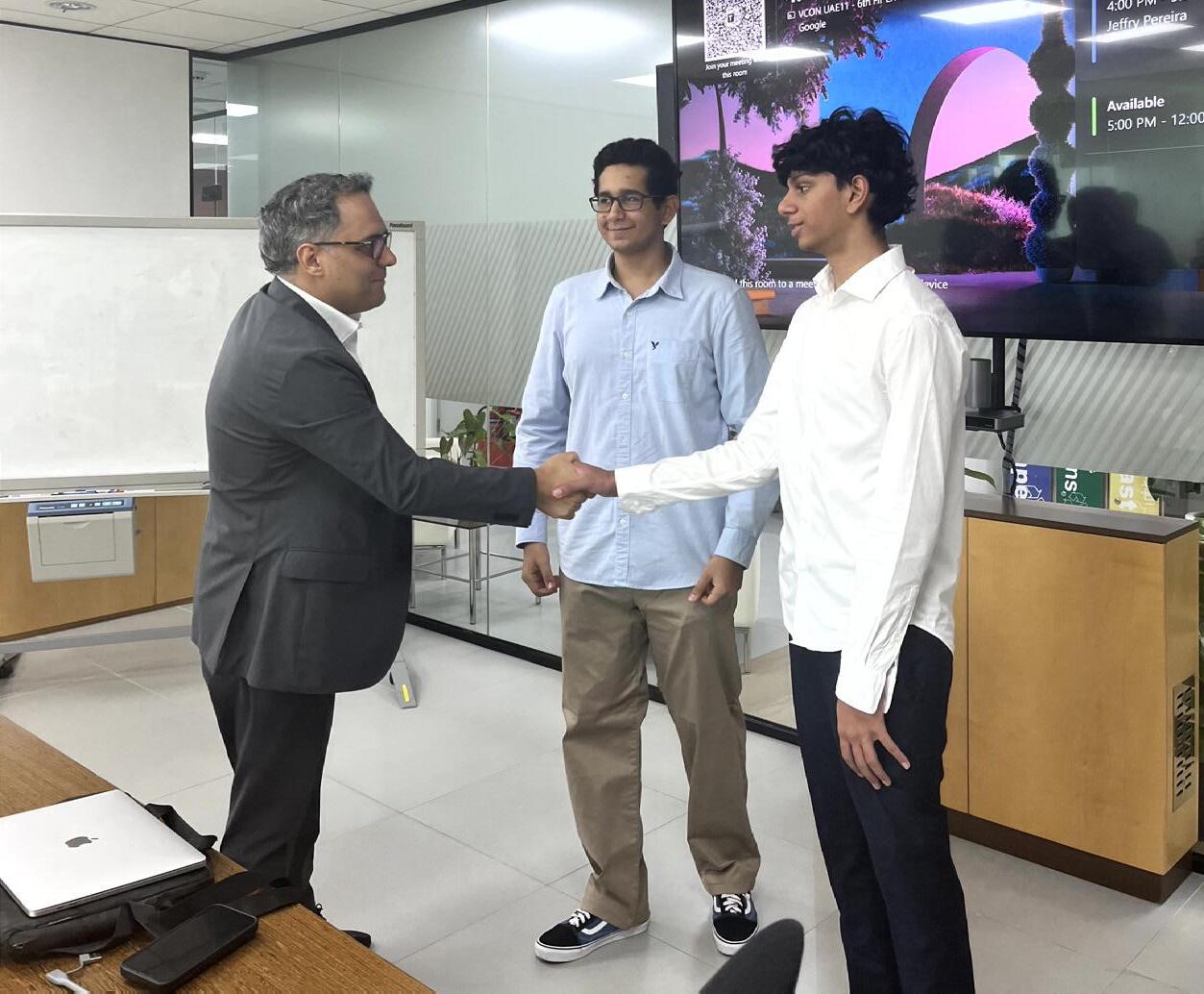


This whole process sharpened my ability to think critically and communicate effectively—two skills that have already proven to be invaluable.
The highlight? Presenting our final project to top management! Standing in front of my manager and receiving both praise and constructive feedback was a proud moment. It wasn’t just about completing the project—it was about knowing we had created something that had a real impact on the company.
The warm, welcoming atmosphere at Al-Futtaim Group made the whole experience even better. This wasn’t just a regular internship; it gave me genuine insight into corporate life and what it takes to succeed. The best part? Knowing that the sustainable solutions we worked on in SAP engineering could actually make a difference. - Yousif

the talent,
dedication!

Yes, I’ve already made up my mind. I will be a doctor! During my internship at Dubai Silicon Oasis Al-Futtaim Health Hub, I had the chance to get a behind-the-scenes look at a healthcare facility. Watching patient interactions, medical procedures, and how the staff worked with cutting-edge technology was eye-opening and only made me more sure of my career choice.
Though it was mostly observational, I faced a few challenges, like trying to understand the complex protocols and procedures. But asking questions and chatting with my mentors really helped me get a handle on things. By the end, I had a much clearer picture of what it takes to work in healthcare.
This experience taught me the importance of observation, communication, and adaptability—skills that are key for any future doctor. It reinforced my passion for the field and gave me a better understanding of what lies ahead. - Shaghayegh

At first, the constant flow of patients felt overwhelming, and navigating the professional environment of the clinic was a real challenge. But as time went on, I adapted, and that became one of my strengths.
This internship gave me the clarity I needed, not just solidifying my career goals but also helping me understand the layers of complexity in a field I once thought I knew.
One of the most valuable skills I gained was learning to be more analytical and detail-oriented, which helped me tackle problems and find solutions. The experience has truly boosted my confidence and prepared me for any future professional setting. - Shokofe


Mahad and Asad, lost in the endless tangle of cables, trying to figure out if they’re solving IT problems or just untangling spaghetti

The sheer extensiveness and complexity of cable technologies would make any aspiring engineer pause—and it definitely had me doing a double-take.
One of the most exciting moments came during my first week of internship, when I visited the data centre. Walking into the server room felt like stepping into the heart of the operation. Seeing the rows of servers, learning about backup systems like FM 200, and understanding the importance of generators to prevent downtime—suddenly, the magic of cloud technology became very real. Redundancy, I realized, was the superhero of IT!
Exploring different data centre tiers was another eye-opener. Visiting a Tier 3 centre showed me just how much engineering and planning go into keeping things running smoothly and reliably. The level of precision involved in IT infrastructure left me seriously impressed. Of course, with so much going on, the scope of IT felt overwhelming at first. From cybersecurity protocols to SAP setups, it was a lot to take in. But over time, things started to click, and I felt more confident in my understanding of it all. My internship at Al-Futtaim wasn’t just a learning experience—it was a gamechanger. It confirmed my passion for cloud computing and IT infrastructure, and I’m excited to dive deeper into these fields. Big thanks to Kiran Bende for his mentorship, and for giving me the chance to gain hands-on experience. - Mahad
It’s as complex as its tangle of cables—the intricacies of network protocols, managing network security, and troubleshooting connectivity issues. My internship at Al-Futtaim Group’s IT Data Centre was an eye-opener into the vast world of IT operations, and let’s just say, it was anything but boring.
One of the first hurdles was mastering Microsoft Azure cloud services. At first, it felt like trying to solve a puzzle with a million pieces. But thanks to patient mentors and plenty of practice, I got the hang of it, from cloud architecture to deployment and management. Turns out, those fancy cloud terms are pretty essential in modern IT infrastructures.
Working with the network operations team was another highlight. Keeping the network running smoothly felt like being the backstage crew for a big performance—monitoring, managing, and keeping things secure behind the scenes. It was hands-on and sometimes challenging, but it made me appreciate the backbone of the company’s IT environment. One unforgettable moment was being part of a large-scale SAP system upgrade. It was a full-team effort, with plenty of coordination across departments. I learned just how critical enterprise resource planning systems are in keeping everything running like clockwork. - Asad




Immerse yourself in a lifestyle of resort-inspired tranquility, where Al Badia Living transforms everyday living into a luxury retreat. Just minutes from Deira International and Universal American Schools, our residences blend modern elegance with serene surroundings, crafting a peaceful escape in the heart of Dubai.
LIMITED UNITS AVAILABLE: 1 TO 4 BEDROOM APARTMENTS
Secure your place in this sought-after enclave today.